- Affiliate Program

- UNITED STATES
- 台灣 (TAIWAN)
- TÜRKIYE (TURKEY)
- Academic Editing Services
- - Research Paper
- - Journal Manuscript
- - Dissertation
- - College & University Assignments
- Admissions Editing Services
- - Application Essay
- - Personal Statement
- - Recommendation Letter
- - Cover Letter
- - CV/Resume
- Business Editing Services
- - Business Documents
- - Report & Brochure
- - Website & Blog
- Writer Editing Services
- - Script & Screenplay
- Our Editors
- Client Reviews
- Editing & Proofreading Prices
- Wordvice Points
- Partner Discount
- Plagiarism Checker
- APA Citation Generator
- MLA Citation Generator
- Chicago Citation Generator
- Vancouver Citation Generator
- - APA Style
- - MLA Style
- - Chicago Style
- - Vancouver Style
- Writing & Editing Guide
- Academic Resources
- Admissions Resources

How to Make a Research Paper Title with Examples
What is a research paper title and why does it matter?
A research paper title summarizes the aim and purpose of your research study. Making a title for your research is one of the most important decisions when writing an article to publish in journals. The research title is the first thing that journal editors and reviewers see when they look at your paper and the only piece of information that fellow researchers will see in a database or search engine query. Good titles that are concise and contain all the relevant terms have been shown to increase citation counts and Altmetric scores .
Therefore, when you title research work, make sure it captures all of the relevant aspects of your study, including the specific topic and problem being investigated. It also should present these elements in a way that is accessible and will captivate readers. Follow these steps to learn how to make a good research title for your work.
How to Make a Research Paper Title in 5 Steps
You might wonder how you are supposed to pick a title from all the content that your manuscript contains—how are you supposed to choose? What will make your research paper title come up in search engines and what will make the people in your field read it?
In a nutshell, your research title should accurately capture what you have done, it should sound interesting to the people who work on the same or a similar topic, and it should contain the important title keywords that other researchers use when looking for literature in databases. To make the title writing process as simple as possible, we have broken it down into 5 simple steps.
Step 1: Answer some key questions about your research paper
What does your paper seek to answer and what does it accomplish? Try to answer these questions as briefly as possible. You can create these questions by going through each section of your paper and finding the MOST relevant information to make a research title.
Step 2: Identify research study keywords
Now that you have answers to your research questions, find the most important parts of these responses and make these your study keywords. Note that you should only choose the most important terms for your keywords–journals usually request anywhere from 3 to 8 keywords maximum.
Step 3: Research title writing: use these keywords
“We employed a case study of 60 liver transplant patients around the US aged 20-50 years to assess how waiting list volume affects the outcomes of liver transplantation in patients; results indicate a positive correlation between increased waiting list volume and negative prognosis after the transplant procedure.”
The sentence above is clearly much too long for a research paper title. This is why you will trim and polish your title in the next two steps.
Step 4: Create a working research paper title
To create a working title, remove elements that make it a complete “sentence” but keep everything that is important to what the study is about. Delete all unnecessary and redundant words that are not central to the study or that researchers would most likely not use in a database search.
“ We employed a case study of 60 liver transplant patients around the US aged 20-50 years to assess how the waiting list volume affects the outcome of liver transplantation in patients ; results indicate a positive correlation between increased waiting list volume and a negative prognosis after transplant procedure ”
Now shift some words around for proper syntax and rephrase it a bit to shorten the length and make it leaner and more natural. What you are left with is:
“A case study of 60 liver transplant patients around the US aged 20-50 years assessing the impact of waiting list volume on outcome of transplantation and showing a positive correlation between increased waiting list volume and a negative prognosis” (Word Count: 38)
This text is getting closer to what we want in a research title, which is just the most important information. But note that the word count for this working title is still 38 words, whereas the average length of published journal article titles is 16 words or fewer. Therefore, we should eliminate some words and phrases that are not essential to this title.
Step 5: Remove any nonessential words and phrases from your title
Because the number of patients studied and the exact outcome are not the most essential parts of this paper, remove these elements first:
“A case study of 60 liver transplant patients around the US aged 20-50 years assessing the impact of waiting list volume on outcomes of transplantation and showing a positive correlation between increased waiting list volume and a negative prognosis” (Word Count: 19)
In addition, the methods used in a study are not usually the most searched-for keywords in databases and represent additional details that you may want to remove to make your title leaner. So what is left is:
“Assessing the impact of waiting list volume on outcome and prognosis in liver transplantation patients” (Word Count: 15)
In this final version of the title, one can immediately recognize the subject and what objectives the study aims to achieve. Note that the most important terms appear at the beginning and end of the title: “Assessing,” which is the main action of the study, is placed at the beginning; and “liver transplantation patients,” the specific subject of the study, is placed at the end.
This will aid significantly in your research paper title being found in search engines and database queries, which means that a lot more researchers will be able to locate your article once it is published. In fact, a 2014 review of more than 150,000 papers submitted to the UK’s Research Excellence Framework (REF) database found the style of a paper’s title impacted the number of citations it would typically receive. In most disciplines, articles with shorter, more concise titles yielded more citations.
Adding a Research Paper Subtitle
If your title might require a subtitle to provide more immediate details about your methodology or sample, you can do this by adding this information after a colon:
“ : a case study of US adult patients ages 20-25”
If we abide strictly by our word count rule this may not be necessary or recommended. But every journal has its own standard formatting and style guidelines for research paper titles, so it is a good idea to be aware of the specific journal author instructions , not just when you write the manuscript but also to decide how to create a good title for it.
Research Paper Title Examples
The title examples in the following table illustrate how a title can be interesting but incomplete, complete by uninteresting, complete and interesting but too informal in tone, or some other combination of these. A good research paper title should meet all the requirements in the four columns below.
Tips on Formulating a Good Research Paper Title
In addition to the steps given above, there are a few other important things you want to keep in mind when it comes to how to write a research paper title, regarding formatting, word count, and content:
- Write the title after you’ve written your paper and abstract
- Include all of the essential terms in your paper
- Keep it short and to the point (~16 words or fewer)
- Avoid unnecessary jargon and abbreviations
- Use keywords that capture the content of your paper
- Never include a period at the end—your title is NOT a sentence
Research Paper Writing Resources
We hope this article has been helpful in teaching you how to craft your research paper title. But you might still want to dig deeper into different journal title formats and categories that might be more suitable for specific article types or need help with writing a cover letter for your manuscript submission.
In addition to getting English proofreading services , including paper editing services , before submission to journals, be sure to visit our academic resources papers. Here you can find dozens of articles on manuscript writing, from drafting an outline to finding a target journal to submit to.
- Privacy Policy
Buy Me a Coffee

Home » Research Paper Title – Writing Guide and Example
Research Paper Title – Writing Guide and Example
Table of Contents

Research Paper Title
Research Paper Title is the name or heading that summarizes the main theme or topic of a research paper . It serves as the first point of contact between the reader and the paper, providing an initial impression of the content, purpose, and scope of the research . A well-crafted research paper title should be concise, informative, and engaging, accurately reflecting the key elements of the study while also capturing the reader’s attention and interest. The title should be clear and easy to understand, and it should accurately convey the main focus and scope of the research paper.
Examples of Research Paper Title
Here are some Good Examples of Research Paper Title:
- “Investigating the Relationship Between Sleep Duration and Academic Performance Among College Students”
- “The Impact of Artificial Intelligence on Employment: A Systematic Review”
- “The Effectiveness of Mindfulness-Based Interventions for Anxiety: A Meta-Analysis”
- “Exploring the Effects of Social Support on Mental Health in Patients with Chronic Illness”
- “Assessing the Effectiveness of Cognitive-Behavioral Therapy for Depression: A Randomized Controlled Trial”
- “The Impact of Social Media Influencers on Consumer Behavior: A Systematic Review”
- “Investigating the Link Between Personality Traits and Leadership Effectiveness”
- “The Effect of Parental Incarceration on Child Development: A Longitudinal Study”
- “Exploring the Relationship Between Cultural Intelligence and Cross-Cultural Adaptation: A Meta-Analysis”
- “Assessing the Effectiveness of Mindfulness-Based Stress Reduction for Chronic Pain Management”.
- “The Effects of Social Media on Mental Health: A Meta-Analysis”
- “The Impact of Climate Change on Global Crop Yields: A Longitudinal Study”
- “Exploring the Relationship between Parental Involvement and Academic Achievement in Elementary School Students”
- “The Ethics of Genetic Editing: A Review of Current Research and Implications for Society”
- “Understanding the Role of Gender in Leadership: A Comparative Study of Male and Female CEOs”
- “The Effect of Exercise on Cognitive Function in Older Adults: A Randomized Controlled Trial”
- “The Impacts of COVID-19 on Mental Health: A Cross-Cultural Comparison”
- “Assessing the Effectiveness of Online Learning Platforms: A Case Study of Coursera”
- “Exploring the Link between Employee Engagement and Organizational Performance”
- “The Effects of Income Inequality on Social Mobility: A Comparative Analysis of OECD Countries”
- “Exploring the Relationship Between Social Media Use and Mental Health in Adolescents”
- “The Impact of Climate Change on Crop Yield: A Case Study of Maize Production in Sub-Saharan Africa”
- “Examining the Effectiveness of Cognitive Behavioral Therapy for Anxiety Disorders: A Meta-Analysis”
- “An Analysis of the Relationship Between Employee Job Satisfaction and Organizational Commitment”
- “Assessing the Impacts of Wilderness Areas on Local Economies: A Case Study of Yellowstone National Park”
- “The Role of Parental Involvement in Early Childhood Education: A Review of the Literature”
- “Investigating the Effects of Technology on Learning in Higher Education”
- “The Use of Artificial Intelligence in Healthcare: Opportunities and Challenges”
- “A Study of the Relationship Between Personality Traits and Leadership Styles in Business Organizations”.
How to choose Research Paper Title
Choosing a research paper title is an important step in the research process. A good title can attract readers and convey the essence of your research in a concise and clear manner. Here are some tips on how to choose a research paper title:
- Be clear and concise: A good title should convey the main idea of your research in a clear and concise manner. Avoid using jargon or technical language that may be confusing to readers.
- Use keywords: Including keywords in your title can help readers find your paper when searching for related topics. Use specific, descriptive terms that accurately describe your research.
- Be descriptive: A descriptive title can help readers understand what your research is about. Use adjectives and adverbs to convey the main ideas of your research.
- Consider the audience : Think about the audience for your paper and choose a title that will appeal to them. If your paper is aimed at a specialized audience, you may want to use technical terms or jargon in your title.
- Avoid being too general or too specific : A title that is too general may not convey the specific focus of your research, while a title that is too specific may not be of interest to a broader audience. Strive for a title that accurately reflects the focus of your research without being too narrow or too broad.
- Make it interesting : A title that is interesting or provocative can capture the attention of readers and draw them into your research. Use humor, wordplay, or other creative techniques to make your title stand out.
- Seek feedback: Ask colleagues or advisors for feedback on your title. They may be able to offer suggestions or identify potential problems that you hadn’t considered.
Purpose of Research Paper Title
The research paper title serves several important purposes, including:
- Identifying the subject matter : The title of a research paper should clearly and accurately identify the topic or subject matter that the paper addresses. This helps readers quickly understand what the paper is about.
- Catching the reader’s attention : A well-crafted title can grab the reader’s attention and make them interested in reading the paper. This is particularly important in academic settings where there may be many papers on the same topic.
- Providing context: The title can provide important context for the research paper by indicating the specific area of study, the research methods used, or the key findings.
- Communicating the scope of the paper: A good title can give readers an idea of the scope and depth of the research paper. This can help them decide if the paper is relevant to their interests or research.
- Indicating the research question or hypothesis : The title can often indicate the research question or hypothesis that the paper addresses, which can help readers understand the focus of the research and the main argument or conclusion of the paper.
Advantages of Research Paper Title
The title of a research paper is an important component that can have several advantages, including:
- Capturing the reader’s attention : A well-crafted research paper title can grab the reader’s attention and encourage them to read further. A captivating title can also increase the visibility of the paper and attract more readers.
- Providing a clear indication of the paper’s focus: A well-written research paper title should clearly convey the main focus and purpose of the study. This helps potential readers quickly determine whether the paper is relevant to their interests.
- Improving discoverability: A descriptive title that includes relevant keywords can improve the discoverability of the research paper in search engines and academic databases, making it easier for other researchers to find and cite.
- Enhancing credibility : A clear and concise title can enhance the credibility of the research and the author. A title that accurately reflects the content of the paper can increase the confidence readers have in the research findings.
- Facilitating communication: A well-written research paper title can facilitate communication among researchers, enabling them to quickly and easily identify relevant studies and engage in discussions related to the topic.
- Making the paper easier to remember : An engaging and memorable research paper title can help readers remember the paper and its findings. This can be especially important in fields where researchers are constantly inundated with new information and need to quickly recall important studies.
- Setting expectations: A good research paper title can set expectations for the reader and help them understand what the paper will cover. This can be especially important for readers who are unfamiliar with the topic or the research area.
- Guiding research: A well-crafted research paper title can also guide future research by highlighting gaps in the current literature or suggesting new areas for investigation.
- Demonstrating creativity: A creative research paper title can demonstrate the author’s creativity and originality, which can be appealing to readers and other researchers.
About the author
Muhammad Hassan
Researcher, Academic Writer, Web developer
You may also like

How to Cite Research Paper – All Formats and...

Delimitations in Research – Types, Examples and...

Research Paper Format – Types, Examples and...

Research Design – Types, Methods and Examples

Research Paper Introduction – Writing Guide and...

Research Paper Conclusion – Writing Guide and...

6 Important Tips on Writing a Research Paper Title
When you are searching for a research study on a particular topic, you probably notice that articles with interesting, descriptive research titles draw you in. By contrast, research paper titles that are not descriptive are usually passed over, even though you may write a good research paper with interesting contents. This shows the importance of coming up with a good title for your research paper when drafting your own manuscript.
Importance of a Research Title
The research title plays a crucial role in the research process, and its importance can be summarized as follows:

Why do Research Titles Matter?
Before we look at how to title a research paper, let’s look at a research title example that illustrates why a good research paper should have a strong title.
Imagine that you are researching meditation and nursing, and you want to find out if any studies have shown that meditation makes nurses better communicators. You conduct a keyword search using the keywords “nursing”, “communication”, and “meditation.” You come up with results that have the following titles:
- Benefits of Meditation for the Nursing Profession: A Quantitative Investigation
- Why Mindful Nurses Make the Best Communicators
- Meditation Gurus
- Nurses on the Move: A Quantitative Report on How Meditation Can Improve Nurse Performance
All four of these research paper titles may describe very similar studies—they could even be titles for the same study! As you can see, they give very different impressions.
- Title 1 describes the topic and the method of the study but is not particularly catchy.
- Title 2 partly describes the topic, but does not give any information about the method of the study—it could simply be a theoretical or opinion piece.
- Title 3 is somewhat catchier but gives almost no information at all about the article.
- Title 4 begins with a catchy main title and is followed by a subtitle that gives information about the content and method of the study.
As we will see, Title 4 has all the characteristics of a good research title.
Characteristics of a Good Research Title
According to rhetoric scholars Hairston and Keene, making a good title for a paper involves ensuring that the title of the research accomplishes four goals as mentioned below:
- It should predict the content of the research paper .
- It should be interesting to the reader .
- It should reflect the tone of the writing .
- It should contain important keywords that will make it easier to be located during a keyword search.
Let’s return to the examples in the previous section to see how to make a research title.
As you can see in the table above, only one of the four example titles fulfills all of the criteria of a suitable research paper title.
Related: You’ve chosen your study topic, but having trouble deciding where to publish it? Here’s a comprehensive course to help you identify the right journal .
Tips for Writing an Effective Research Paper Title
When writing a research title, you can use the four criteria listed above as a guide. Here are a few other tips you can use to make sure your title will be part of the recipe for an effective research paper :
- Make sure your research title describes (a) the topic, (b) the method, (c) the sample, and (d) the results of your study. You can use the following formula:
[ Result ]: A [ method ] study of [ topic ] among [ sample ] Example : Meditation makes nurses perform better: a qualitative study of mindfulness meditation among German nursing students
- Avoid unnecessary words and jargons. Keep the title statement as concise as possible. You want a title that will be comprehensible even to people who are not experts in your field. Check our article for a detailed list of things to avoid when writing an effective research title .
- Make sure your title is between 5 and 15 words in length.
- If you are writing a title for a university assignment or for a particular academic journal, verify that your title conforms to the standards and requirements for that outlet. For example, many journals require that titles fall under a character limit, including spaces. Many universities require that titles take a very specific form, limiting your creativity.
- Use a descriptive phrase to convey the purpose of your research efficiently.
- Most importantly, use critical keywords in the title to increase the discoverability of your article.

Resources for Further Reading
In addition to the tips above, there are many resources online that you can use to help write your research title. Here is a list of links that you may find useful as you work on creating an excellent research title:
- The University of Southern California has a guide specific to social science research papers: http://libguides.usc.edu/writingguide/title
- The Journal of European Psychology Students has a blog article focusing on APA-compliant research paper titles: http://blog.efpsa.org/2012/09/01/how-to-write-a-good-title-for-journal-articles/
- This article by Kristen Hamlin contains a step-by-step approach to writing titles: http://classroom.synonym.com/choose-title-research-paper-4332.html
Are there any tips or tricks you find useful in crafting research titles? Which tip did you find most useful in this article? Leave a comment to let us know!
- Hairston, M., & Keene, M. 2003. Successful writing . 5th ed. New York: Norton.
- University of Southern California. 2017. Organizing your social sciences research paper: choosing a title . [Online] Available at: http://libguides.usc.edu/writingguide/title
Thank you so much:) Have a nice day!
Thank you so much, it helped me.. God bless..
Thank you for the excellent article and tips for creating a research work, because I always forget about such an essential element as the keywords when forming topics. In particular, I have found a rapid help with the formation of informative and sound titles that also conforms to the standards and requirements.
I am doing a research work on sales girls or shop girls using qualititative method. Basicly I am from Pakistan and writing on the scenario of mycountry. I am really confused about my research title can you kindly give some suggestions and give me an approperaite tilte

Hi Zubair, Thank you for your question. However, the information you have provided is insufficient for drafting an appropriate title. Information on what exactly you intend to study would be needed in order to draft a meaningful title. Meanwhile, you can try drafting your own title after going through the following articles our website: https://www.enago.com/academy/top-10-tips-on-choosing-an-attractive-research-title/ , https://www.enago.com/academy/writing-a-good-research-title-things-to-avoid/ , https://www.enago.com/academy/write-irresistible-research-paper-title/ We would be happy to give you feedback and suggest changes if required. Did you get a chance to install our free Mobile App? https://www.enago.com/academy/mobile-app/ . Make sure you subscribe to our weekly newsletter https://www.enago.com/academy/subscribe-now/ .
thanks for helping me like this!!
Thank you for this. It helped me improve my research title. I just want to verify to you the title I have just made. “Ensuring the safety: A Quantitative Study of Radio Frequency Identification system among the selected students of ( school’s name ).
(I need your reply asap coz we will be doing the chap. 1 tomorrow. Thank u in advance. 🙂 )
I am actually doing a research paper title. I want to know more further in doing research title. Can you give me some tips on doing a research paper?
Hi Joan, Thank you for your question. We are glad to know that you found our resources useful. Your feedback is very valuable to us. You can try drafting your own title after going through the following articles on our website: https://www.enago.com/academy/top-10-tips-on-choosing-an-attractive-research-title/ , https://www.enago.com/academy/writing-a-good-research-title-things-to-avoid/ , https://www.enago.com/academy/write-irresistible-research-paper-title/
We would be happy to give you feedback and suggest changes if required. Did you get a chance to install our free Mobile App? https://www.enago.com/academy/mobile-app/ . Make sure you subscribe to our weekly newsletter https://www.enago.com/academy/subscribe-now/ .
That really helpful. Thanks alot
Thank you so much. It’s really help me.
Thanks for sharing this tips. Title matters a lot for any article because it contents Keywords of article. It should be eye-catchy. Your article is helpful to select title of any article.
nice blog that you have shared
This blog is very informative for me. Thanks for sharing.
nice information that you have shared
i’m found in selecting my ma thesis title ,so i’m going to do my final research after the proposal approved. Your post help me find good title.
I need help. I need a research title for my study about early mobilization of the mechanically ventilated patients in the ICU. Any suggestions would be highly appreciated.
Thank you for posting your query on the website. When writing manuscripts, too many scholars neglect the research title. This phrase, along with the abstract, is what people will mostly see and read online. Title research of publications shows that the research paper title does matter a lot. Both bibliometrics and altmetrics tracking of citations are now, for better or worse, used to gauge a paper’s “success” for its author(s) and the journal publishing it. Interesting research topics coupled with good or clever yet accurate research titles can draw more attention to your work from peers and the public alike. You can check through the following search results for titles on similar topics: https://www.google.com/search?q=early+mobilization+of+the+mechanically+ventilated+patients+in+the+icu&rlz=1C1GCEU_enIN907IN907&oq=&aqs=chrome.0.69i59.4920093j0j7&sourceid=chrome&ie=UTF-8 .
We hope this would be helpful in drafting an attractive title for your research paper.
Please let us know in case of any other queries.
I’ve been surfing online more than 3 hours these days, but I never found any interesting article like yours. It is lovely worth enough for me. In my opinion, if all website owners and bloggers made just right content material as you did, the internet will be much more helpful than ever before.
Wonderful article! We will bee linking to this particularly great post on our site. Keep up the good writing.
Wow that was odd. I just wrote an very long comment but after I clicked submit my comment didn’t show up. Grrrr… well I’m not writing all that over again. Anyhow, just wanted to say fantastic blog!
In case the topic is new research before you’re writing. And then to stand out, you end up being different.and be inclined to highlight yourself.
There are many free directories, and more paid lists.
To be honest your article is informative. I search many site to know about writing but I didn’t get the information I needed. I saw your site and I read it. I got some new information from here. I think some of your tips can be applied to those too! Thank you so very much for such informative and useful content.
Nice and well written content you have shared with us. thanks a lot!
Thanks for sharing these tips… Rockwide
Its helpful. a person can grab knowledge through it.
Rate this article Cancel Reply
Your email address will not be published.

Enago Academy's Most Popular Articles

- Reporting Research
Choosing the Right Analytical Approach: Thematic analysis vs. content analysis for data interpretation
In research, choosing the right approach to understand data is crucial for deriving meaningful insights.…

Comparing Cross Sectional and Longitudinal Studies: 5 steps for choosing the right approach
The process of choosing the right research design can put ourselves at the crossroads of…

- Career Corner
Unlocking the Power of Networking in Academic Conferences
Embarking on your first academic conference experience? Fear not, we got you covered! Academic conferences…

Research Recommendations – Guiding policy-makers for evidence-based decision making
Research recommendations play a crucial role in guiding scholars and researchers toward fruitful avenues of…

- AI in Academia
Disclosing the Use of Generative AI: Best practices for authors in manuscript preparation
The rapid proliferation of generative and other AI-based tools in research writing has ignited an…
Choosing the Right Analytical Approach: Thematic analysis vs. content analysis for…
Comparing Cross Sectional and Longitudinal Studies: 5 steps for choosing the right…
How to Design Effective Research Questionnaires for Robust Findings

Sign-up to read more
Subscribe for free to get unrestricted access to all our resources on research writing and academic publishing including:
- 2000+ blog articles
- 50+ Webinars
- 10+ Expert podcasts
- 50+ Infographics
- 10+ Checklists
- Research Guides
We hate spam too. We promise to protect your privacy and never spam you.
I am looking for Editing/ Proofreading services for my manuscript Tentative date of next journal submission:

What should universities' stance be on AI tools in research and academic writing?
Have a language expert improve your writing
Run a free plagiarism check in 10 minutes, generate accurate citations for free.
- Knowledge Base
- Academic writing
Forging good titles in academic writing
Published on March 20, 2015 by Shane Bryson . Revised on July 23, 2023.
The title is the first thing your reader will see, and most readers will make their first judgements of your work based on it. For this reason, it’s important to think about your titles carefully.
Instantly correct all language mistakes in your text
Upload your document to correct all your mistakes in minutes

Table of contents
Informative, striking, appropriate, title templates, writing effective headings, other interesting articles, informative title.
Your title should, above all else, convey the topic of your paper. In other words, no matter how witty, clever, original, or otherwise appealing your title may be, it fails if it is not informative.
Decide whether you’ve given a sense of the paper’s topic and claims by comparing your title’s content to the most important aspect(s) of your dissertation statement or hypothesis and conclusions.
Striking title
A striking title is one that entices your audience to read, so know your audience’s tastes.
The analogy of cultivating sexual attraction in a prospective mate is useful here: some audiences will be enticed by a title’s edginess (as with, for example, V. Alneng’s “‘What the Fuck is a Vietnam?’ Touristic Phantasms and the Popcolonization of [the] Vietnam [War],” published in Critique on Anthropology ); others will almost always prefer a more straightforward title (as with J.C. Henderson’s “War as a tourist attraction: The case of Vietnam,” published in the International Journal of Tourism Research ).
You should be able to gauge how edgy your title can be by the tone of your discipline or the publication you’re submitting to, and your main concern should be forming a title that appeals to your readers’ specific tastes.
Consider also that a title that highlights the paper’s fresh insights will often be striking.
An endocrinologist, for example, might become very excited upon seeing the collaboratively authored article “Comparison of the effects on glycaemic control and β-cell function in newly diagnosed type 2 diabetes patients of treatment with exenatide, insulin or pioglitazone: A multicentre randomized parallel-group trial,” published in 2015 in the Journal of Internal Medicine .
This rather long title is more acceptable in the sciences, where what readers tend to find provocative in a title is the degree to which it reveals the paper’s specifics.
Appropriate title
Ensuring that your title is appropriate in a way of making sure not only that your audience understands it, but also that its appeal contributes to its meaning. To make sure the title will be understood, you need to consider how familiar your research topic will be to your audience.
In an academic essay, you can use highly technical terms in your title, but generally avoid terms that the average well-read person in your discipline might not know.
In any writing that has a broad audience, titles need to avoid language that is too sophisticated; a news article, for example, should be easily understood by all.
As a second consideration of appropriateness, make sure that your title does not entice without substance.
The title of Alneng’s paper, for example, does not use “fuck” merely to shock and therefore entice the reader; the uncommon use of a swearword here helps convey the topic of the article: more or less vulgar representations of Vietnam.
The same is true for other striking titles, such as Nancy Tuana’s “Coming to Understand: Orgasm and the Epistemology of Ignorance,” published in Hypatia .
The title’s sexually charged play on words (“coming to understand”) hooks the audience, but is not merely a hook. The pun is directly relevant to the essay’s argument, which is that sexual pleasure offers an important form of knowledge.
The only proofreading tool specialized in correcting academic writing - try for free!
The academic proofreading tool has been trained on 1000s of academic texts and by native English editors. Making it the most accurate and reliable proofreading tool for students.

Try for free
- Use key terms. Find words that your audience can easily identify as markers of the topic matter. These will include, for example, terms that convey the field of research, central concepts, or subjects of study.
- Identify the context (sometimes called “the location”). By context, I mean the source or the setting of the discussion, depending on discipline. In a history paper this might be a certain century or era; in literary studies a certain book or author; and in the sciences an organism or compound.
The following is a list of title formats, with examples of each. I’ve given the names of the publications in brackets to give a sense of how different disciplines treat titles.
Note that these are not mutually exclusive patterns (i.e. it’s possible to have various combinations; e.g. General & interesting: Informative & specific). Note also that this is not meant to be an exhaustive list.
- Striking: Informative – The Specter of Wall Street: “Bartleby, the Scrivener” and the Language of Commodities ( American Literature )
- Informative: Striking – Carbon capture and storage: How green can black be? ( Science )
- General: Specific – The issues of the sixties: An exploratory study in the dynamics of public opinion ( Public Opinion Quarterly )
- “Quotation”: Discussion (social studies) – “I’d rather not talk about it”: Adolescents’ and young adults’ use of topic avoidance in stepfamilies ( Journal of Applied Communication Research )
- “Quotation”: Discussion (literary studies) – “I Would Prefer Not To”: Giorgio Agamben, Bartleby and the Potentiality of the Law ( Law and Critique )
- Simple and precise – Methodological issues in the use of Tsimshian oral Traditions (Adawx) in Archaeology ( Canadian Journal of Archaeology )
- Topic: Method – Mortality in sleep apnea patients: A multivariate analysis of risk factors ( Sleep )
- Topic: Significance – LC3 binds externalized cardiolipin on injured mitochondria to signal mitophagy in neurons: Implications for Parkinson disease ( Autophagy )
- Technical and very specific – Single-shot quantum nondemolition measurement of a quantum-dot electron spin using cavity exciton-polaritons ( Physical Review )
Although similar, headings are not the same as titles. Headings head paragraphs and help structure a document. Effective headings make your paper easily scannable.
Common high level headings in dissertations and research papers are “Methods”, “Research results”, and “Discussion”. Lower level headings are often more descriptive.
Check for common mistakes
Use the best grammar checker available to check for common mistakes in your text.
Fix mistakes for free
If you want to know more about AI for academic writing, AI tools, or fallacies make sure to check out some of our other articles with explanations and examples or go directly to our tools!
- Begging the question fallacy
- Hasty generalization fallacy
- Equivocation fallacy
- False cause fallacy
- Sunk cost fallacy
- Deep learning
- Generative AI
- Machine learning
- Reinforcement learning
- Supervised vs. unsupervised learning
(AI) Tools
- Grammar Checker
- Paraphrasing Tool
- Text Summarizer
- AI Detector
- Plagiarism Checker
- Citation Generator
Cite this Scribbr article
If you want to cite this source, you can copy and paste the citation or click the “Cite this Scribbr article” button to automatically add the citation to our free Citation Generator.
Bryson, S. (2023, July 23). Forging good titles in academic writing. Scribbr. Retrieved April 2, 2024, from https://www.scribbr.com/academic-writing/forging-good-titles-in-academic-writing/
Is this article helpful?
Shane Bryson
Shane finished his master's degree in English literature in 2013 and has been working as a writing tutor and editor since 2009. He began proofreading and editing essays with Scribbr in early summer, 2014.
Unlimited Academic AI-Proofreading
✔ Document error-free in 5minutes ✔ Unlimited document corrections ✔ Specialized in correcting academic texts
Best Tips on How to Title an Essay

How to Make a Good Title for an Essay
The success of an essay heavily depends on its title. This may not come as a surprise given that the essay title is the first aspect to provide the reader with a sneak peek into the text. It piques our interest to read the paper in the first place and gives us a preview of what to expect from the author.
Our research paper writing help prepared a thorough guide on how to title an essay. Here you may find tips and tricks for developing an effective APA or MLA essay title. So, let's dive straight into the article for more exciting details!
Essay Title Format
During your essay writing process, ensure you know the stylistic requirements before beginning an essay. Knowing the format you need to employ is crucial because different style manuals may have varying requirements. Mostly, you could have used an APA or MLA essay title format. Our service, where you can buy essay online , explains these two in more detail below.
Essay Title MLA
If you're required to create an essay title MLA format, check whether your instructor wants you to make a separate cover page. If not, put a heading at the beginning of your work that includes your name, the name of your professor, the course ID, and, lastly, the date.
On the other hand, if you must present a cover page for your essay title MLA, then you need to include the following:
- The name of the college
- The title of your paper
- The subtitle of your paper, if applicable
- Your first and last name
- Your teacher or professor's name
- The class name or course number
- The date the paper is due
The formatting instructions are as follows:
- Double-spaced
- Times New Roman font
- Size 12 font
- Apart from very short terms, each word's initial letter should be capitalized. The initial word, however, must always be uppercase.
- The title page shouldn't include a header with the page numbers.
Essay Title APA
Having discussed the MLA format essay title, let's explore what the APA student title page includes:
- The paper title
- Author names
- Institutional affiliation where the author carried out the study
- Name and number of the course
- Professor name
- Page number
The title of an essay format instructions:
- double-spaced
- 1" margins
- 12-point Times New Roman
- According to APA, your title should be targeted and brief, without unnecessary words or abbreviations
How to Choose a Good Title for an Essay: Important Qualities
Nobody will read a dull headline. Your title should grab your audience's attention and encourage them to read the rest of the work. As it is one of the initial things readers see, having a strong attention grabber is essential when writing an essay from scratch. To fully understand how to come up with a title for essay that is strong and exciting, let's consider a few following factors:
Employ a Catchy Hook - Usually, the title of essay format follows a similar basic structure, especially if they are used for an academic article. The hook serves as a unique component that attracts the reader. It's a captivating statement informing others about the topic of the essay. You can also explore several types of sentences with examples that can help you develop the ideal hook structure.
Consider Topic Keywords - These are essential terms or expressions pertinent to your subject and help your reader understand the focus and body of your article. These focus keywords should serve as a brief, one- to two-word article summary. You can choose some terms from the research topic your instructor gave you, but after your thesis statement is formed, this is where you should hunt for ideas.
Use a Colon - A colon is frequently used in academic titles to separate concepts and sentences. The standard procedure is to place a clever remark or brief quotation before the colon. Although these beginning words offer flavor, they can be overdone. Because of this, some individuals find using the colon to be repugnant. Therefore be careful not to misuse this method.
Ask a Question - To write essay title that is strong, consider asking a question. But, use it with caution because posing a question will make your tone less formal. As long as the question is suitably phrased to meet the subject of your essay, feel free to employ it. Always check to see if the title question still applies to your points in the essay's body. The thesis statement should be appropriately reflected as well.
Find Inspirational Quotes - There is no formula for selecting essay titles from the textual content. You may get playful and choose any quotation, proverb, or catchphrase that applies to your particular publication and works as a title. You may also create a great essay title using well-known expressions or idioms. Doing so will help your readers relate to and feel more comfortable discussing your subject.

Here are other rules for how to create a good title:
- Title every section of writing: In the process of writing, create interesting subheadings to give your paragraphs an identity. Also, they make your text look ordered and clear.
- The title must bear the theme of the text: choose a title that summarizes the essay.
- Capitalize all words with certain exceptions: Capitalize the first letter of every word in the title, but do not capitalize pronouns, articles, prepositions, and conjunctions.
- Avoid underlining the title: Since topics come in boldface, underlining it will amount to overemphasis. Some authorities say that if you must underline it, do not bolden it.
- Review the final version of the title: Do not forget to do a quick review of the final version of the title—check for grammar, structure, spelling and so on. Re-read it to determine if the title has given justice to the essay. Confirm if the topic is catchy enough to attract your reader’s attention.
- When using a colon in your title, follow the rules: Since we are dealing with punctuation rules here, let us talk about the colon – when you have two eye-catching topics, separate them with a colon.
Student’s Guide on How to Come Up with a Title for an Essay
Titling an essay can be easy, but there are a few core principles to be taken into account. The following tips will help you stay on track and avoid any common pitfalls.
Essay Goes First
Never start with a title! If you write it before the rest of the text, it will be based on it, and it should be vice versa. Writing an essay before choosing a heading will give you a clear understanding of what should make sense to the reader. Re-read the finished paper several times to decide on the title. The last thing to create is a title - such strategy will give more time to spend on crafting an essay outline, conducting research, or writing the paper itself.

What are you writing about? What is the style of your paper, and is it an academic essay or a free-form essay like a narrative essay? If the topic of your essay is “Do people who commit heinous crimes deserve the death penalty?” your title should not be humorous; it should be strict and to the point.
If your topic is “Why do people like watching funny cat videos?”, feel free to craft a funny title. Determine the tone of your essay and base your title on it—in consideration with the essay’s topic.
The tone can be:
- Serious - “The implications of global warming”
- Funny - “How cats and dogs love their masters”
- Amiable - “Ways to fight depression”
- Persuasive - “Why positive thinking is a must have skill for every person”
- Informative - “Ten rules for creating a chemical at home”
The main goal of a title is to name its paper. There is no need to tell an entire story in the title, or provide any useless details. Sum up your paper in a few words! Another way to do this is to sum up your thesis statement, as it represents the main idea of your essay. Take your thesis and squeeze it into 3-4 words. Imagine that you are creating a title for your favourite newspaper or a slogan for Coca-Cola.
Don’t use fancy words! Take 2-3 main words (keywords), put them together, and stop wasting your time. Avoid jargon and abbreviations.
Search engine optimization (SEO) is something that can help any student and young writer reap benefits. While working on a title, detect the words related to the central idea of the paper. Type the words into the search field of Google and add the word “quote.” A search engine will show numerous web pages with in-text quotations that could be useful. Select the fragment you like. It is possible to learn how to make a creative title for an essay in this way.
Discover several more tips from experts:
- Never forget the “What,” “Who,” “When,” “How,” “Why,” and “Where” questions (if you start with one of these questions, your title has a chance of getting noticed);
- Come up with an unexpected image not related to the selected topic;
- Sometimes, starting with a lie increases the chances of a title being able to catch an eye;
- Review our catchy essay title examples.
Need Some Help With Your Essay's Title?
Feel free to contact EssayPro and we will provide you with a writing help at a moment’s notice. With the years of essay writing experience, titling becomes second nature, so you no longer need to worry about having a catchy headline on your paper.
Essay Title Examples: Bad vs Good
The strongest essay titles condense lengthy essays into concise statements. When wondering how to make an essay title, think carefully about your stylistic choices and essay format to produce an excellent one. Our dissertation help has provided essay title examples to let you understand the difference between good and bad ones more vividly.

Bad Essay Title Examples
As we discussed how to create an essay title and the specific elements that go into it, you should have a clear idea of how important it is to craft a strong title. In contrast, first, look at weak essay title ideas that can break your paper. This should serve as an example of why your heading should not be like this:
Ex 1: ' How Television Has Changed Our World ' - too vast and not informative
Ex 2: 'The Ara Pacis Augustae' - unclear for those who don't know Latin
Ex 3: 'The Most Poisonous Frog' - does not provide any insight
Ex 4: 'A Brief History of Subcultures and How They Manifest Themselves in a Constantly Changing Socio-Economic Environment' - too long and complicated
Ex 5: 'The Little Mermaid 29 Years Later: Selling a Harmful Sexist Message Through a Naughty Image' - inappropriate language
Good Essay Title Examples
Now that you know what a bad essay title looks like, let's explore good essay title examples as their substitutes. Examine the following essay title format styles that will give you a clear understanding.
Ex 1: ' The Electronic Babysitter: A Social History of Uses of the Television' - gives an exact description of what the essay will be about
Ex 2: ' The Modern Historical Significance of the Ara Pacis Augustae to the City of Rome' - here, the reader can understand what they will be reading about
Ex 3: ' A Deadly Beauty: The Evolution of Skin Coloration and Toxicity of the Poisonous Dart Frog' - clear, informative, and on-point.
Ex 4: 'Reconsidering Counterculture in Contemporary Society' - informative enough and brief
Ex 5: 'The Projection of Gender Stereotypes in The Little Mermaid' - employs appropriate language
Catchy Essay Title Ideas
You now understand that long, complicated headlines do not accurately convey the paper's main idea. Take ample time to consider the word choice before tilting your work. How do you create good essay titles? Think creatively and with common sense. But meanwhile, for your convenience, we compiled title ideas for essays you may use as inspiration.
Persuasive Essay Titles
- Why Receiving College Education is Important: Examining Long-term Benefits
- Face-to-Face Courses Cannot Be Replaced by Online Learning
- An MBA Does Not Ensure Corporate Success.
- Every Company Should Adopt a Green Strategy.
- Energy Drinks Represent a Lucrative Market Segment.
- Aircraft, Excess Weight Charges, Need to be Prohibited.
- Patients' Life Shouldn't be Put to Death by Nurses.
- Google Glasses May Increase the Number of Auto Accidents.
- All of the Conventional Malls Will Soon be Replaced By Online Shopping
- How Do Team-building Exercises Contribute to the Development of Inventions?
- Illegal immigrants are entitled to remain in the US.
Academic Essay Titles
- Several English Dialects: The Link Between Various Cultures
- Instagram: A social media innovation
- Is it possible to reverse drug-induced brain damage, and if so, how?
- What the Future Holds for Humans in the Light of Artificial Intelligence
- The Story of Two Nations after Decades of Conflict: North and South Korea
- Video Games and Their Learning Context in Schools
- Free Wi-Fi: Strategies for Enhancing the City's Economy
Strong Research Paper Titles
- Digital World Cybersecurity
- E-business to Provide New Paths for Booksellers
- Outsourcing for Large Businesses
- Preparing for College Costs for High School Students
- What News Reporters Should Do in the Digital Age and How to Do It: Examples
- The Transformative Power of Music: How Heavy Metal Impacted My Life
Best Essay Titles for College Students
- The Possible Benefits and Risks of Artificial Intelligence for Humans
- The Potential for Time Travel in Virtual Reality
- What Role Has Mathematics Played in Human History?
- How to Succeed in the Real Estate Industry
- E-Commerce: An Empire of Virtual Businesses Worth Millions of Dollars
- How to Achieve Financial Independence in the Digital Age Without Opening a Real Business
More Creative Titles for Essays
- When getting rewarded for their grades, would kids do better left alone?
- How Does Fake News Impact the Mainstream press?
- Homelessness in Contemporary Society: A Dilemma
- What News Reporters' Best Job Is in the Digital Age and How to Uphold It
- Elon Musk: Brilliant Mind or Insane Person?
- Positives and Negatives of Employing a Smoker
- Do We Employ the Appropriate Student Success Metrics?
Professional Academic Help
Now that you know how to make a good title for an essay, you should also understand that you should approach the task as a process. While composing your essay title, you must condense your whole thesis and point of discussion into a single, concise, yet powerful sentence. If you have time before your deadline, give it some thought and don't hurry.
Don't forget that you can always rely on our professional academic assistance, whether you need a reflection paper , ideas for a strong essay title, or any other academic papers. Consider the following words - write my essay for me - magic keywords for delegating your most complex tasks to our skilled writers!
Is the Volume of Schoolwork Getting Out of Hand?
Get essays online to do your work without stress. You may always count on our experienced writers for help with any endeavor!
Related Articles
%20(1).webp)
View the latest institution tables
View the latest country/territory tables
How to write a good research paper title
“Unread science is lost science .”

Credit: Mykyta Dolmatov/Getty
“Unread science is lost science.”
28 July 2020

Mykyta Dolmatov/Getty
With the influx of publications brought on by the pandemic, it’s become more challenging than ever for researchers to attract attention to their work.
Understanding which elements of a title will attract readers – or turn them away – has been proven to increase a paper’s citations and Altmetric score .
“In the era of information overload, most students and researchers do not have time to browse the entire text of a paper,” says Patrick Pu , a librarian at the National University of Singapore.
“The title of a paper, together with its abstract, become very important to capture and sustain the attention of readers.”
1. A good title avoids technical language
Since the primary audience of a paper is likely to be researchers working in the same field, using technical language in the title seems to make sense.
But this alienates the wider lay audience, which can bring valuable attention to your work . It can also alienate inexperienced researchers, or those who have recently entered the field.
“A good title does not use unnecessary jargon,” says Elisa De Ranieri , editor-in-chief at the Nature Communications journal (published by Springer Nature, which also publishes Nature Index.) “It communicates the main results in the study in a way that is clear and accessible, ideally to non-specialists or researchers new to the field.”
How-to: When crafting a title, says De Ranieri, write down the main result of the manuscript in a short paragraph. Shorten the text to make it more concise, while still remaining descriptive. Repeat this process until you have a title of fewer than 15 words.
2. A good title is easily searchable
Most readers today are accessing e-journals, which are indexed in scholarly databases such as Scopus and Google Scholar.
“Although these databases usually index the full text of papers, retrieval weightage for ‘Title’ is usually higher than other fields, such as ‘Results’,” Pu explains.
At the National University of Singapore, Pu and his colleagues run information literacy programmes for editors and authors. They give advice for publishing best practice, such as how to identify the most commonly used keywords in literature searches in a given field.
“A professor once told us how he discovered that industry experts were using a different term or keyword to describe his research area,” says Pu.
“He had written a seminal paper that did not include this ‘industry keyword’. He believes his paper, which was highly cited by academics, would have a higher citation count if he had included this keyword in the title. As librarians, we try to highlight this example to our students so that they will consider all possible keywords to use in their searches and paper titles.”
How-to: Authors should speak to an academic librarian at their institution to gain an understanding of keyword and search trends in their field of research. This should inform how the paper title is written.
3. A good title is substantiated by data
Authors should be cautious to not make any claims in the title that can’t be backed up by evidence.
“For instance, if you make a discovery with potential therapeutic relevance, the title should specify whether it was tested or studied in animals or humans/human samples,” says Irene Jarchum , senior editor at the journal Nature Biotechnology (also published by Springer Nature, which publishes the Nature Index.)
Jarchum adds that titles can be contentious because different authors have different views on the use of specific words, such as acronyms, or more fundamentally, what the main message of the title should be.
Some authors may over-interpret the significance of their preliminary findings, and want to reflect this in the title.
How-to: If you know your paper will be contentious within the scientific community, have the data ready to defend your decisions .
4. A good title sparks curiosity
A one-liner that sparks a reader’s interest can be very effective.
“A title has to pique the interest of the person searching for literature in a split-second – enough that they click on the title to read the abstract. Unread science is lost science,” says Christine Mayer , editor-in-chief of the journal Advanced Therapeutics .
Paper titles such as, "White and wonderful? Microplastics prevail in snow from the Alps to the Arctic" ( 2019 Science ), and “Kids these days: Why the youth of today seem lacking” ( 2019 Science Advances ) are good examples of this principle. Both papers have high Altmetric Attention scores, indicating that they have been widely read and discussed online.
How-to: Take note of the characteristics of paper titles that spark your own interest. Keep a record of these and apply the same principles to your own paper titles.
When you choose to publish with PLOS, your research makes an impact. Make your work accessible to all, without restrictions, and accelerate scientific discovery with options like preprints and published peer review that make your work more Open.
- PLOS Biology
- PLOS Climate
- PLOS Complex Systems
- PLOS Computational Biology
- PLOS Digital Health
- PLOS Genetics
- PLOS Global Public Health
- PLOS Medicine
- PLOS Mental Health
- PLOS Neglected Tropical Diseases
- PLOS Pathogens
- PLOS Sustainability and Transformation
- PLOS Collections
- How to Write a Great Title

Maximize search-ability and engage your readers from the very beginning
Your title is the first thing anyone who reads your article is going to see, and for many it will be where they stop reading. Learn how to write a title that helps readers find your article, draws your audience in and sets the stage for your research!
How your title impacts the success of your article
Researchers are busy and there will always be more articles to read than time to read them. Good titles help readers find your research, and decide whether to keep reading. Search engines use titles to retrieve relevant articles based on users’ keyword searches. Once readers find your article, they’ll use the title as the first filter to decide whether your research is what they’re looking for. A strong and specific title is the first step toward citations, inclusion in meta-analyses, and influencing your field.

What to include in a title
Include the most important information that will signal to your target audience that they should keep reading.
Key information about the study design
Important keywords
What you discovered
Writing tips
Getting the title right can be more difficult than it seems, and researchers refine their writing skills throughout their career. Some journals even help editors to re-write their titles during the publication process!

- Keep it concise and informative What’s appropriate for titles varies greatly across disciplines. Take a look at some articles published in your field, and check the journal guidelines for character limits. Aim for fewer than 12 words, and check for journal specific word limits.
- Write for your audience Consider who your primary audience is: are they specialists in your specific field, are they cross-disciplinary, are they non-specialists?
- Entice the reader Find a way to pique your readers’ interest, give them enough information to keep them reading.
- Incorporate important keywords Consider what about your article will be most interesting to your audience: Most readers come to an article from a search engine, so take some time and include the important ones in your title!
- Write in sentence case In scientific writing, titles are given in sentence case. Capitalize only the first word of the text, proper nouns, and genus names. See our examples below.

Don’t
- Write your title as a question In most cases, you shouldn’t need to frame your title as a question. You have the answers, you know what you found. Writing your title as a question might draw your readers in, but it’s more likely to put them off.
- Sensationalize your research Be honest with yourself about what you truly discovered. A sensationalized or dramatic title might make a few extra people read a bit further into your article, but you don’t want them disappointed when they get to the results.
Examples…
Format: Prevalence of [disease] in [population] in [location]
Example: Prevalence of tuberculosis in homeless women in San Francisco
Format: Risk factors for [condition] among [population] in [location]
Example: Risk factors for preterm births among low-income women in Mexico City
Format (systematic review/meta-analysis): Effectiveness of [treatment] for [disease] in [population] for [outcome] : A systematic review and meta-analysis
Example: Effectiveness of Hepatitis B treatment in HIV-infected adolescents in the prevention of liver disease: A systematic review and meta-analysis
Format (clinical trial): [Intervention] improved [symptoms] of [disease] in [population] : A randomized controlled clinical trial
Example: Using a sleep app lessened insomnia in post-menopausal women in southwest United States: A randomized controlled clinical trial
Format (general molecular studies): Characterization/identification/evaluation of [molecule name] in/from [organism/tissue] (b y [specific biological methods] )
Example: Identification of putative Type-I sex pheromone biosynthesis-related genes expressed in the female pheromone gland of Streltzoviella insularis
Format (general molecular studies): [specific methods/analysis] of organism/tissue reveal insights into [function/role] of [molecule name] in [biological process]
Example: Transcriptome landscape of Rafflesia cantleyi floral buds reveals insights into the roles of transcription factors and phytohormones in flower development
Format (software/method papers): [tool/method/software] for [what purpose] in [what research area]
Example: CRISPR-based tools for targeted transcriptional and epigenetic regulation in plants
Tip: How to edit your work
Editing is challenging, especially if you are acting as both a writer and an editor. Read our guidelines for advice on how to refine your work, including useful tips for setting your intentions, re-review, and consultation with colleagues.
- How to Write an Abstract
- How to Write Your Methods
- How to Report Statistics
- How to Write Discussions and Conclusions
- How to Edit Your Work
The contents of the Peer Review Center are also available as a live, interactive training session, complete with slides, talking points, and activities. …
The contents of the Writing Center are also available as a live, interactive training session, complete with slides, talking points, and activities. …
There’s a lot to consider when deciding where to submit your work. Learn how to choose a journal that will help your study reach its audience, while reflecting your values as a researcher…
- USC Libraries
- Research Guides
Organizing Your Social Sciences Research Paper
- Choosing a Title
- Purpose of Guide
- Design Flaws to Avoid
- Independent and Dependent Variables
- Glossary of Research Terms
- Reading Research Effectively
- Narrowing a Topic Idea
- Broadening a Topic Idea
- Extending the Timeliness of a Topic Idea
- Academic Writing Style
- Making an Outline
- Paragraph Development
- Research Process Video Series
- Executive Summary
- The C.A.R.S. Model
- Background Information
- The Research Problem/Question
- Theoretical Framework
- Citation Tracking
- Content Alert Services
- Evaluating Sources
- Primary Sources
- Secondary Sources
- Tiertiary Sources
- Scholarly vs. Popular Publications
- Qualitative Methods
- Quantitative Methods
- Insiderness
- Using Non-Textual Elements
- Limitations of the Study
- Common Grammar Mistakes
- Writing Concisely
- Avoiding Plagiarism
- Footnotes or Endnotes?
- Further Readings
- Generative AI and Writing
- USC Libraries Tutorials and Other Guides
- Bibliography
The title summarizes the main idea or ideas of your study. A good title contains the fewest possible words needed to adequately describe the content and/or purpose of your research paper.
Importance of Choosing a Good Title
The title is the part of a paper that is read the most, and it is usually read first . It is, therefore, the most important element that defines the research study. With this in mind, avoid the following when creating a title:
- If the title is too long, this usually indicates there are too many unnecessary words. Avoid language, such as, "A Study to Investigate the...," or "An Examination of the...." These phrases are obvious and generally superfluous unless they are necessary to covey the scope, intent, or type of a study.
- On the other hand, a title which is too short often uses words which are too broad and, thus, does not tell the reader what is being studied. For example, a paper with the title, "African Politics" is so non-specific the title could be the title of a book and so ambiguous that it could refer to anything associated with politics in Africa. A good title should provide information about the focus and/or scope of your research study.
- In academic writing, catchy phrases or non-specific language may be used, but only if it's within the context of the study [e.g., "Fair and Impartial Jury--Catch as Catch Can"]. However, in most cases, you should avoid including words or phrases that do not help the reader understand the purpose of your paper.
- Academic writing is a serious and deliberate endeavor. Avoid using humorous or clever journalistic styles of phrasing when creating the title to your paper. Journalistic headlines often use emotional adjectives [e.g., incredible, amazing, effortless] to highlight a problem experienced by the reader or use "trigger words" or interrogative words like how, what, when, or why to persuade people to read the article or click on a link. These approaches are viewed as counter-productive in academic writing. A reader does not need clever or humorous titles to catch their attention because the act of reading research is assumed to be deliberate based on a desire to learn and improve understanding of the problem. In addition, a humorous title can merely detract from the seriousness and authority of your research.
- Unlike everywhere else in a college-level social sciences research paper [except when using direct quotes in the text], titles do not have to adhere to rigid grammatical or stylistic standards. For example, it could be appropriate to begin a title with a coordinating conjunction [i.e., and, but, or, nor, for, so, yet] if it makes sense to do so and does not detract from the purpose of the study [e.g., "Yet Another Look at Mutual Fund Tournaments"] or beginning the title with an inflected form of a verb such as those ending in -ing [e.g., "Assessing the Political Landscape: Structure, Cognition, and Power in Organizations"].
Appiah, Kingsley Richard et al. “Structural Organisation of Research Article Titles: A Comparative Study of Titles of Business, Gynaecology and Law.” Advances in Language and Literary Studies 10 (2019); Hartley James. “To Attract or to Inform: What are Titles for?” Journal of Technical Writing and Communication 35 (2005): 203-213; Jaakkola, Maarit. “Journalistic Writing and Style.” In Oxford Research Encyclopedia of Communication . Jon F. Nussbaum, editor. (New York: Oxford University Press, 2018): https://oxfordre.com/communication.
Structure and Writing Style
The following parameters can be used to help you formulate a suitable research paper title:
- The purpose of the research
- The scope of the research
- The narrative tone of the paper [typically defined by the type of the research]
- The methods used to study the problem
The initial aim of a title is to capture the reader’s attention and to highlight the research problem under investigation.
Create a Working Title Typically, the final title you submit to your professor is created after the research is complete so that the title accurately captures what has been done . The working title should be developed early in the research process because it can help anchor the focus of the study in much the same way the research problem does. Referring back to the working title can help you reorient yourself back to the main purpose of the study if you find yourself drifting off on a tangent while writing. The Final Title Effective titles in research papers have several characteristics that reflect general principles of academic writing.
- Indicate accurately the subject and scope of the study,
- Rarely use abbreviations or acronyms unless they are commonly known,
- Use words that create a positive impression and stimulate reader interest,
- Use current nomenclature from the field of study,
- Identify key variables, both dependent and independent,
- Reveal how the paper will be organized,
- Suggest a relationship between variables which supports the major hypothesis,
- Is limited to 5 to 15 substantive words,
- Does not include redundant phrasing, such as, "A Study of," "An Analysis of" or similar constructions,
- Takes the form of a question or declarative statement,
- If you use a quote as part of the title, the source of the quote is cited [usually using an asterisk and footnote],
- Use correct grammar and capitalization with all first words and last words capitalized, including the first word of a subtitle. All nouns, pronouns, verbs, adjectives, and adverbs that appear between the first and last words of the title are also capitalized, and
- Rarely uses an exclamation mark at the end of the title.
The Subtitle Subtitles are frequently used in social sciences research papers because it helps the reader understand the scope of the study in relation to how it was designed to address the research problem. Think about what type of subtitle listed below reflects the overall approach to your study and whether you believe a subtitle is needed to emphasize the investigative parameters of your research.
1. Explains or provides additional context , e.g., "Linguistic Ethnography and the Study of Welfare Institutions as a Flow of Social Practices: The Case of Residential Child Care Institutions as Paradoxical Institutions." [Palomares, Manuel and David Poveda. Text & Talk: An Interdisciplinary Journal of Language, Discourse and Communication Studies 30 (January 2010): 193-212]
2. Adds substance to a literary, provocative, or imaginative title or quote , e.g., "Listen to What I Say, Not How I Vote": Congressional Support for the President in Washington and at Home." [Grose, Christian R. and Keesha M. Middlemass. Social Science Quarterly 91 (March 2010): 143-167]
3. Qualifies the geographic scope of the research , e.g., "The Geopolitics of the Eastern Border of the European Union: The Case of Romania-Moldova-Ukraine." [Marcu, Silvia. Geopolitics 14 (August 2009): 409-432]
4. Qualifies the temporal scope of the research , e.g., "A Comparison of the Progressive Era and the Depression Years: Societal Influences on Predictions of the Future of the Library, 1895-1940." [Grossman, Hal B. Libraries & the Cultural Record 46 (2011): 102-128]
5. Focuses on investigating the ideas, theories, or work of a particular individual , e.g., "A Deliberative Conception of Politics: How Francesco Saverio Merlino Related Anarchy and Democracy." [La Torre, Massimo. Sociologia del Diritto 28 (January 2001): 75 - 98]
6. Identifies the methodology used , e.g. "Student Activism of the 1960s Revisited: A Multivariate Analysis Research Note." [Aron, William S. Social Forces 52 (March 1974): 408-414]
7. Defines the overarching technique for analyzing the research problem , e.g., "Explaining Territorial Change in Federal Democracies: A Comparative Historical Institutionalist Approach." [ Tillin, Louise. Political Studies 63 (August 2015): 626-641.
With these examples in mind, think about what type of subtitle reflects the overall approach to your study. This will help the reader understand the scope of the study in relation to how it was designed to address the research problem.
Anstey, A. “Writing Style: What's in a Title?” British Journal of Dermatology 170 (May 2014): 1003-1004; Balch, Tucker. How to Compose a Title for Your Research Paper. Augmented Trader blog. School of Interactive Computing, Georgia Tech University; Bavdekar, Sandeep B. “Formulating the Right Title for a Research Article.” Journal of Association of Physicians of India 64 (February 2016); Choosing the Proper Research Paper Titles. AplusReports.com, 2007-2012; Eva, Kevin W. “Titles, Abstracts, and Authors.” In How to Write a Paper . George M. Hall, editor. 5th edition. (Oxford: John Wiley and Sons, 2013), pp. 33-41; Hartley James. “To Attract or to Inform: What are Titles for?” Journal of Technical Writing and Communication 35 (2005): 203-213; General Format. The Writing Lab and The OWL. Purdue University; Kerkut G.A. “Choosing a Title for a Paper.” Comparative Biochemistry and Physiology Part A: Physiology 74 (1983): 1; “Tempting Titles.” In Stylish Academic Writing . Helen Sword, editor. (Cambridge, MA: Harvard University Press, 2012), pp. 63-75; Nundy, Samiran, et al. “How to Choose a Title?” In How to Practice Academic Medicine and Publish from Developing Countries? A Practical Guide . Edited by Samiran Nundy, Atul Kakar, and Zulfiqar A. Bhutta. (Springer Singapore, 2022), pp. 185-192.
- << Previous: Academic Writing Style
- Next: Making an Outline >>
- Last Updated: Apr 5, 2024 1:38 PM
- URL: https://libguides.usc.edu/writingguide
How to Write a Research Paper Title

Knowing how to write a research paper title is an art that not every researcher possesses, and researchers often spend a lot of time skimming through articles to find the right research paper title.
According to an interesting estimate, researchers read more than 100 publications every year and spend long hours, weeks and months searching for and reading articles relevant to their field of study. 1 While open access publishing and online repositories have made it easier to find articles, researchers still need to browse through a sea of research, often using research paper titles, to find relevant information for their research study. Researchers also face the challenge of ensuring their work reaches a broader audience in order to get more citations. This is where the importance of a good title for a research paper becomes evident.
Your research paper title is one of the first things readers in your research paper and plays an important role in influencing whether they will actually go through the entire article. This makes it critical to have a good research paper title that captures the reader’s attention. In this article, we look at the key characteristics of a good research title and what to keep in mind to create a research title that works for you.
Generate outstanding research titles in a click with Paperpal. Try it now!
What to keep in mind when writing a research paper title
- Convey the key research findings: Before writing a research paper title, list down what your study is about, what you have achieved or discovered, and the methodology used. Try and identify the one or two key elements that make your study novel or significant in your subject area. Combine these elements to create the best research title that showcases your article accurately and effectively.
- Choose a declarative research paper title : Declarative titles are more informative and help readers to quickly grasp what the body of the article may contain. Therefore, it is considered to be more impactful and more likely to attract the reader’s attention. Additionally, most editors agree that papers with declarative titles are more likely to be shared online, allowing researchers to reach a far wider audience. 2
- A good research title must pique reader interest : Researchers browsing through online platforms during their literature search often spend only a few seconds to read the title and evaluate an article’s relevance. This makes it important to create a catchy title for your research paper that will spark curiosity in the minds of your audience, which may prompt them pause, read, share, and discuss your research paper.
- Avoid making any unsubstantiated claims: This is an important aspect to keep in mind when creating research paper titles. While it may be tempting to write titles with claims that will immediately attract reader attention and get you more citations, your research should be able to back-up these claims with substantive, studied evidence. Failing to do so can create mistrust about the research and even hurt your reputation.
- Keep it simple and avoid jargon: It’s tempting to use technical words in a research paper title when you know that your primary audience is most likely to be other researchers working in the same field. However, this can prove counter-productive as readers who are not familiar with these complicated words may end up skipping your article. Some early career researchers might also give your paper a pass as they may feel that it is too technical for them so avoid using jargon.
Let Paperpal generate a suitable title for your content in minutes. Try it now!
- Use phrases to keep your research title concise: One mistake early career researchers make is using full sentences to write the research paper title. Avoid complex phrases and unnecessary details as it makes the title unnecessarily lengthy. Remember to ensure proper syntax when trying to rephrase the title to make it leaner. A good research paper title offers a concise summary of the paper’s content; keep your title to under 12 words as lengthy titles can be hard to understand and may seem unfocused and uninteresting.
- Include keywords to make your article discoverable: Today most researchers turn to online databases and search engines like Google Scholar to find the right research. This makes it critical to identify and use the best keywords for your research subject/topic when creating a research title. The best research paper title is one that is easily discoverable, making it easy for your readers to find and read your article.
A review of more than 150,000 papers submitted to UK’s Research Excellence Framework (REF) database found that the style of a research paper’s title impacted the number of citations it would typically receive. 3 Writing a good research paper title is worth the time and effort, and we’re sure the points listed above will help!
How to generate research paper titles with Paperpal?
A research paper title is the first impression for journal editors, reviewers, and readers to understand the aim and purpose of your research study. However, picking a research paper title that encapsulates your research’s content can be daunting. Your research paper title should accurately capture your work, contain highly searched keywords, and should also sound interesting to people who work on a similar topic.
Paperpal’s secure generative AI helps you write research paper titles twice as fast, ensuring they align with your research topic. Follow these simple steps to create an impactful research paper title:
- Sign Up or Log In: Start by creating an account or logging into Paperpal .
- Paste your content: Once logged in, paste your research paper’s content or abstract onto the document.
- Generate your title: Click on ‘Templates’ in the side navigation pane, go to Titles, and select ‘Generate’ .
Paperpal will analyze your content and propose a fitting research paper title. If it doesn’t quite hit the mark, simply click regenerate to get additional title options until you find the perfect one. Remember, while Paperpal provides a solid starting point, personalizing the title to capture the essence of your research is key to making it stand out.
- How Scientists Retrieve Publications: An Empirical Study of How the Internet Is Overtaking Paper Media. Journal of Electronic Publishing, December 2000. [Accessed November 3, 2022] Available at https://quod.lib.umich.edu/j/jep/3336451.0006.202?view=text;rgn=main
- Di Girolamo, N. Health care articles with simple and declarative titles were more likely to be in the Altmetric Top 100. Journal of Clinical Epidemiology, December 2016. [Accessed November 3, 2022] Available at https://www.jclinepi.com/article/S0895-4356(16)30853-8/fulltext
- Hudson, J. An analysis of the titles of papers submitted to the UK REF in 2014: authors, disciplines, and stylistic details. Scientometrics, July 2016. [Accessed November 3, 2022] Available at https://link.springer.com/article/10.1007/s11192-016-2081-4
Frequently Asked Questions (FAQs)
It is generally recommended to avoid using a question to write a good research paper title. Titles should be concise and informative, conveying the main focus of the study. While questions can be used in the introduction or research objectives, a clear and declarative title is preferred to accurately represent the content and purpose of the research.
A research paper title should be concise and to the point. Ideally, it should be around 10 to 12 words or less. A shorter title is more effective in grabbing readers’ attention and conveying the main idea succinctly. However, it’s important to ensure that the title still accurately represents the research and provides enough information for readers to understand the scope of the study.
Including specific keywords related to the research topic can be beneficial. Keywords help in indexing and searching for relevant papers. However, it is not necessary to include all keywords in the title. Instead, focus on incorporating essential and relevant keywords that reflect the core aspects of the study. Use keywords that are commonly used and recognized in the field to increase the discoverability and relevance of your research.
Abbreviations or acronyms should generally be avoided in the research paper title. The title should be clear and easily understandable to a broad audience. If an abbreviation is commonly used in the field and is essential to convey the research focus, it can be included, but it’s important to provide the full term upon its first mention in the paper for clarity.
Whether you can change the research paper title after submission depends on the specific guidelines and policies of the journal or conference. Some publications allow minor revisions, including title changes, during the review process. However, it is best to ensure that the title is carefully chosen and reviewed before submission. If a change is necessary, it is recommended to contact the editor or conference organizers for guidance on whether it’s permissible to modify the title.
The preferred formatting style for research paper titles varies depending on the specific guidelines of the target journal or conference. Generally, sentence case is commonly used, where only the first word and proper nouns are capitalized. However, some publications may prefer title case, where the first letter of each major word is capitalized. It is important to carefully review the submission guidelines or consult the specific style guide recommended by the publication to ensure consistency with their preferred formatting style.
Paperpal is a comprehensive AI writing toolkit that helps students and researchers achieve 2x the writing in half the time. It leverages 21+ years of STM experience and insights from millions of research articles to provide in-depth academic writing, language editing, and submission readiness support to help you write better, faster.
Get accurate academic translations, rewriting support, grammar checks, vocabulary suggestions, and generative AI assistance that delivers human precision at machine speed. Try for free or upgrade to Paperpal Prime starting at US$19 a month to access premium features, including consistency, plagiarism, and 30+ submission readiness checks to help you succeed.
Experience the future of academic writing – Sign up to Paperpal and start writing for free!
Related Reads:
How to write a research paper outline: simple steps for researchers.
- Manuscript Withdrawal: Reasons, Consequences, and How to Withdraw Submitted Manuscripts
- Supplementary Materials in Research: 5 Tips for Authors
- What is an Expository Essay and How to Write It
The Ethics of Using AI in Research and Scientific Writing
You may also like, ai in education: it’s time to change the..., is it ethical to use ai-generated abstracts without..., what are journal guidelines on using generative ai..., should you use ai tools like chatgpt for..., publish research papers: 9 steps for successful publications , how to make translating academic papers less challenging, self-plagiarism in research: what it is and how..., 6 tips for post-doc researchers to take their..., presenting research data effectively through tables and figures, 8 most effective ways to increase motivation for....
Research Paper Writing Guides
Research Paper Title
Last updated on: Mar 27, 2024
How to Write a Research Paper Title That Stands Out
By: Donna C.
11 min read
Reviewed By:
Published on: Jan 8, 2024

A research paper title determines whether the reader or the audience decides to read your paper or not. It is the first thing a reviewer or a journal editor will see when they’re evaluating your work.
Crafting an effective research paper title is more than just stringing together words. It's an art that balances clarity, creativity, and precision. It should be both interesting and engaging at the same time.
If you’re unsure how to give your research paper a suitable title, don’t worry. We will help you out!
This blog contains all the essential details required to craft a balanced and suitable research paper title. With writing steps, tips, and examples, you’ll understand exactly how to write the perfect title.
So, without further ado, let’s get started!
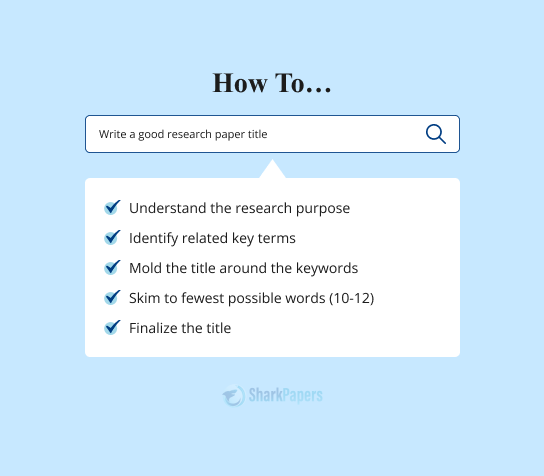
On this Page
Understanding the Importance of Research Paper Titles
Without a proper title that accurately captures the essence and purpose of your research, the paper is almost useless. The importance and significance of a title that strikes the perfect balance between clarity and creativity cannot be overstated.
Here is why a good research paper title is important:
- First Impression: A good title always leaves a positive first impression, influencing the readers to give your paper a thorough read.
- Provides Clarity: It provides a clear idea of your research topic without needing to read the entire paper.
- Relevance : It communicates the importance of your research and its contribution to the field.
- Searchability : Well-chosen keywords make your research easier to find in databases and online searches.
- Innovation : Creativity in the title hints at the innovative nature of your research.
- Professional Impact : A strong title positively influences how your work is perceived by editors and peers.
- Tone Setting : It gives readers a preview of your writing style and the overall approach of your study.
- Academic Identity : A memorable title contributes to your research's identity, making it more likely to be remembered and cited.
Characteristics of a Good Research Paper Title
Here are the 7 common characteristics of a good research paper’s title.
- Provides clarity
- Is relevant
- Includes keywords
- Provides specific details
- Targets the audience
- Doesn’t mislead
Now, let’s understand how to write a research paper title in 5 straightforward steps.

Paper Due? Why Suffer? That's our Job!
5 Easy Steps for A Perfect Research Paper Title
We have broken down the process of crafting strong research paper titles into 5 simple steps.
Here are the research paper title writing steps:
Step 1. Understand the Purpose of Your Research Paper
Making a title that catches attention and tells a story is important, and to do that, you need to know why you're making it. Consider the following questions to understand the purpose of your title:
- What is the central theme of my research?
- Why is my research significant?
- Who is the intended audience for my research?
- What sets my research apart or makes it innovative?
- How can I summarize my research concisely?
Settle down, take your time, and try to answer all these questions. Soon, you’ll be able to have a clear starting path to craft a perfect title for your research paper.
Let’s take an example, and we’ll adjust the questions accordingly.
The title is too long. To start the process of making it concise, answer these questions.
After you’ve found the answers to these questions, you can narrow down your title in the next step after finding the relevant keywords. Let's look at how to accomplish that.
Step 2. Identify Key Terms Related to Your Research
In this step, pinpoint the essential terms that encapsulate the core and scope of your study. Think of these terms as the building blocks of your title, representing the key concepts and focus of your research.
Choose terms that straightforwardly capture what makes your work unique.
For example, in the above sample title that relates to mental well-being for urban citizens, some key terms are:
- Urban residents
- Comprehensive survey
- Daily physical activity
- Mental well-being
- Positive correlation
- Improved mental health
You can turn to modern techniques like using search engines and Google Scholar to find relevant keywords. Such key terms have the potential to boost the online visibility of your paper.
Step 3. Mold Your Title According to the Relevant Keywords
Here is a skimmed-down title that we’ve achieved by shifting some words around, and using the proper syntax:
The title is getting closer to the final stage, but it is still too long. Read the next steps to create a working title for your research document.
Step 4. Skim to The Fewest Words Possible
Short and sweet is the golden rule for a suitable and good research paper title.
Here is how you should keep your title concise:
- Remember that the title is a concise and attention-grabbing piece of text that immediately grabs the reader’s interest
- Trim away any unnecessary details that don't contribute to the core message
- Your title should summarize the intent of your research study effectively
- Avoid using complete sentences in the title
- Use phrases to keep it concise and to the point
For example, the title we crafted in the last step is still quite long. Using the guidelines given above, we can skim it down to:
Typically, a title under 12 words is ideal. Keeping your title concise and using the fewest possible words has the highest chance of capturing the reader's attention. Avoid using any unnecessary words that add length to the title.
Now, to polish this title to perfection, move on to the next step.
Step 5. Finalize Your Title
Once you've trimmed down and adjusted your title, get feedback from others. Is it clear? Does it make them curious? Polish until your title shines like a beacon, inviting people to explore your research.
After feedback, your final title could be:
This final version aims to be clear, concise, and captivating. It sparks interest and urges readers to dive into the details of urban well-being and the impact of daily activity on mental health.

Tough Essay Due? Hire Tough Writers!
Examples of Research Paper Titles
Getting help from practical examples of good research paper titles will help you understand better.
We’ve collected some research title examples here. The following table evaluates the titles on certain factors. A good title should satisfy the complete criteria in the table below:
What is a Research Paper Subtitle?
A research paper subtitle is an additional, explanatory phrase or brief statement that follows the main title of the research paper. Although not a necessity, It provides more context, clarification, or additional information about the study.
Typically, subtitles are common in social sciences research papers. Here are some examples of research paper subtitles.
Main title : “Exploring Dark Matter in the Universe” Subtitle : “Quantum Mechanics and Observational Evidence in the Search for Elusive Cosmic Components”
Main Title : “Neurobiological Mechanisms of Memory Formation” Subtitle : “Examining the Role of Synaptic Plasticity and Neurotransmitter Release in Learning Processes”
Main Title : “Impact of Virtual Reality on Learning Outcomes” Subtitle : “An Experimental Study Assessing the Effectiveness of Immersive Educational Environments in STEM Education”
Main Title : “Inclusive Design for Human-Computer Interaction” Subtitle : “User-Centered Approaches and Accessibility Considerations in Crafting Technological Solutions for Diverse Populations”
Main Title : “Youth Civic Engagement in the Digital Age” Subtitle : “A Comparative Study of Online Activism and Traditional Participation Among Urban and Rural Adolescents”
Some Tips on How to Write a Good Research Paper Title
Although we have covered every writing step in crafting a research paper title, keeping in mind some tips is a good idea as well. Follow these tips to make sure your title is as perfect as it can be:
- Always mold your title toward the target audience
- Choose the language that aligns with the style and tone of your paper
- Don’t end your title with a period (.), as it is not a sentence
- Do not use overly complex words in the title
- Make sure your title accurately represents the intent of your paper
- Use active verbs to convey action or intent
- You can also include a reference to the thesis in your title
- Provide specific details about your focus, methodology, or findings
To wrap things up, writing a title for a research paper is considered one of the most challenging tasks in research writing. Choosing a title that accurately portrays your research work, its focus, and its aim isn’t an easy task.
With our detailed guide on how to craft a captivating research paper title, you can give your research paper an edge. From the initial draft to the final polishing of the title, you can write a great title with a little effort.
However, if you still find it rather challenging to give your paper a suitable title, don’t worry, we have a solution for that as well. This is where our expert writers come to play.
You can reach out to our paper writing service online and tell us exactly what you require. Our professionals have what it takes to craft winning papers. Get research paper help from us at the most affordable rates today!
Frequently Asked Questions
How do i write a good scientific research paper title, abstract, and keywords.
Title : Clearly convey the main focus, be concise, use relevant keywords for searchability. Abstract : Summarize research objectives, methods, results, and conclusions concisely; emphasize significance; avoid jargon. Keywords : Identify core concepts, consider likely search terms, use accepted terminology, be specific to enhance discoverability.
How to write a research paper title page?
Follow these steps:
- Center the title at the top.
- Include author names and affiliations below
- Add a running head if needed.
- Place the page number in the top right
- Use a readable font and follow citation style guidelines
How to write a science report title?
Crafting a science report title involves clearly stating the subject, being concise with key terms, considering audience and style, and adhering to formatting guidelines.
How to make a research paper title page in MLA style?
- Place the title at the center, avoiding bold or underlining
- Below the title, include your name, instructor's name, course, and date, aligned to the left
- Use a readable font (e.g., Times New Roman) in 12-point size
- Double-space all text
- Do not use a separate title page unless instructed otherwise; include this information on the first page of your paper
How to write a title for a lab report?
Crafting a lab report title requires clarity and conciseness. Clearly state the experiment's focus, use key terms, and include relevant variables. Follow any provided formatting guidelines for precision.
What is the best title for a research paper?
There is no universal “best” title for a research paper, as it depends on the specific content and focus of the study. The title should accurately reflect the research topic, be concise, and spark interest.

Donna writes on a broad range of topics, but she is mostly passionate about social issues, current events, and human-interest stories. She has received high praise for her writing from both colleagues and readers alike. Donna is known in her field for creating content that is not only professional but also captivating.
Was This Blog Helpful?
Keep reading.
- Learning How to Write a Research Paper: Step-by-Step Guide
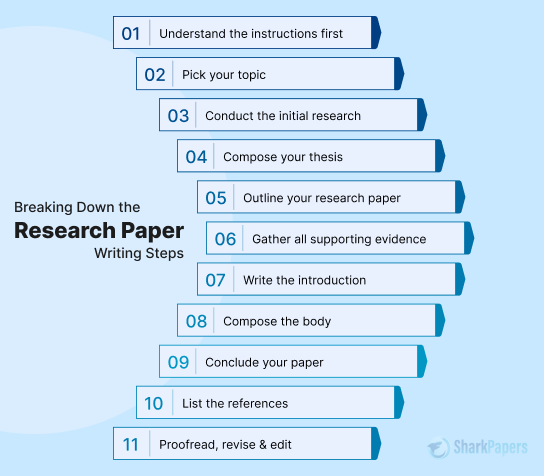
- Best 300+ Ideas For Research Paper Topics in 2024
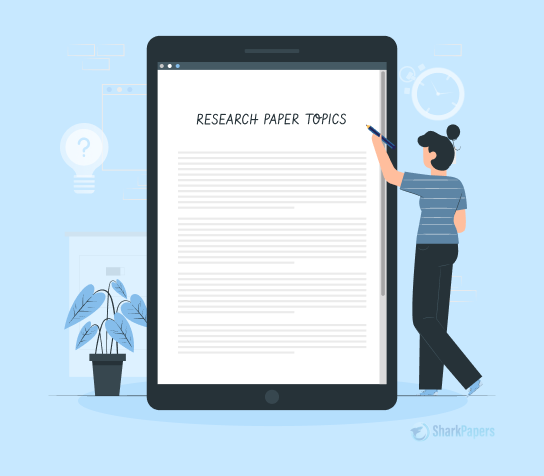
- A Complete Guide to Help You Write a Research Proposal
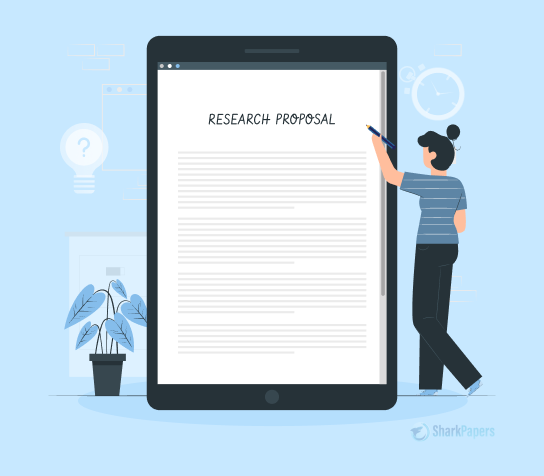
- The Definitive Guide on How to Start a Research Paper
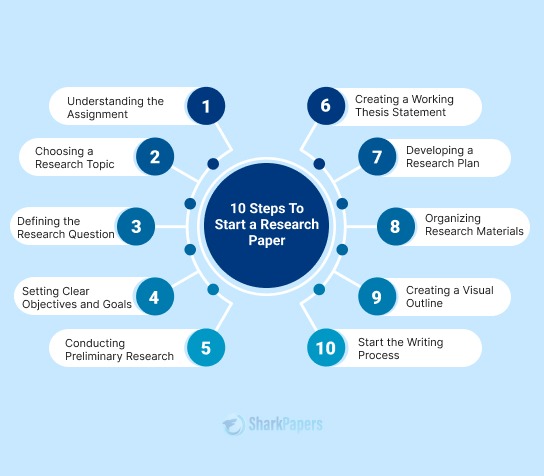
- How To Write An Introduction For A Research Paper - A Complete Guide
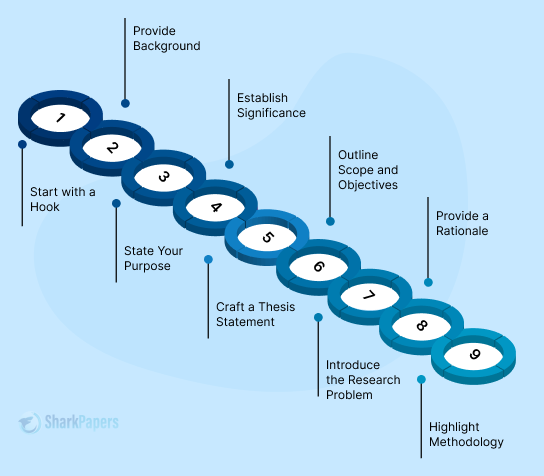
- Learn How To Write An Abstract For A Research Paper with Examples and Tips
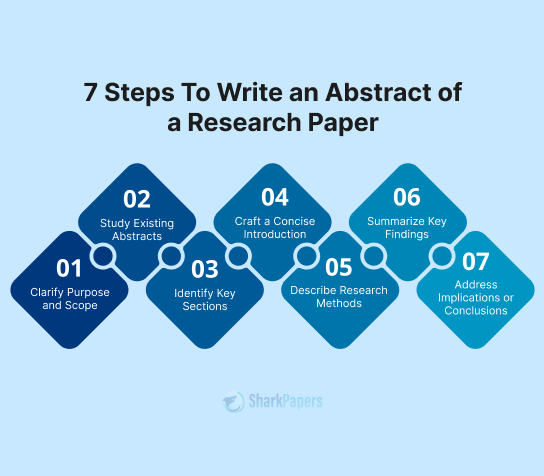
- How to Write a Literature Review for a Research Paper | A Complete Guide
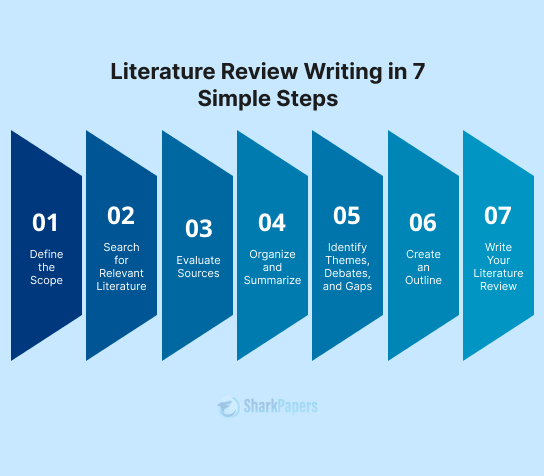
- How To Write The Methods Section of A Research Paper
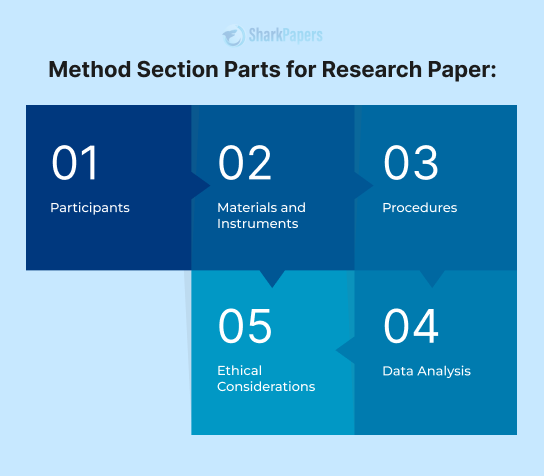
- How to Write a Research Paper Thesis: A Detailed Guide
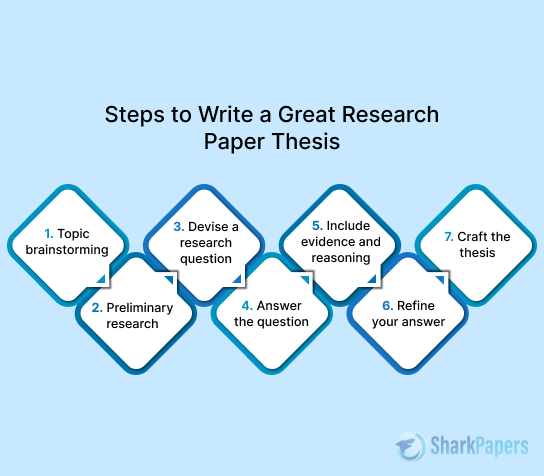
- A Detailed Guide on How To Write a Conclusion for a Research Paper
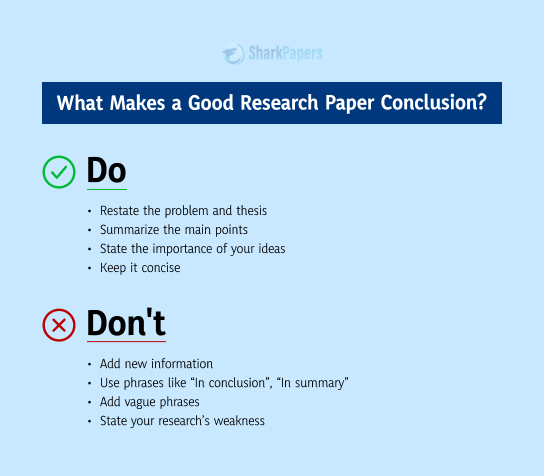
- How To Write The Results Section of A Research Paper | Steps & Tips
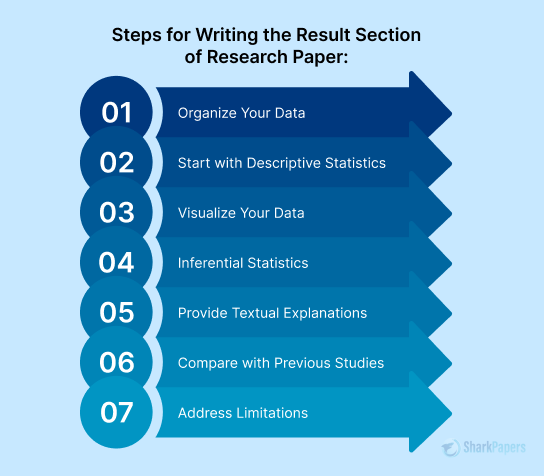
- How to Problem Statement for a Research Paper: An Easy Guide
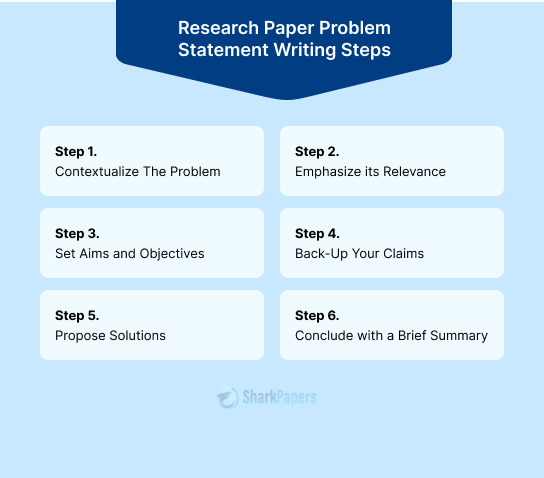
- How to Find Credible Sources for a Research Paper
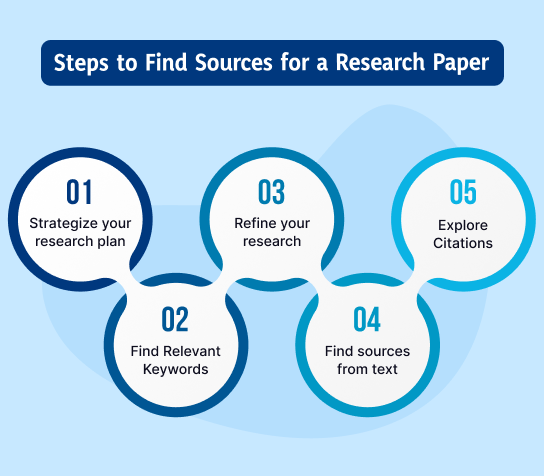
- A Detailed Guide: How to Write a Discussion for a Research Paper
)
- How To Write A Hypothesis In A Research Paper - A Simple Guide
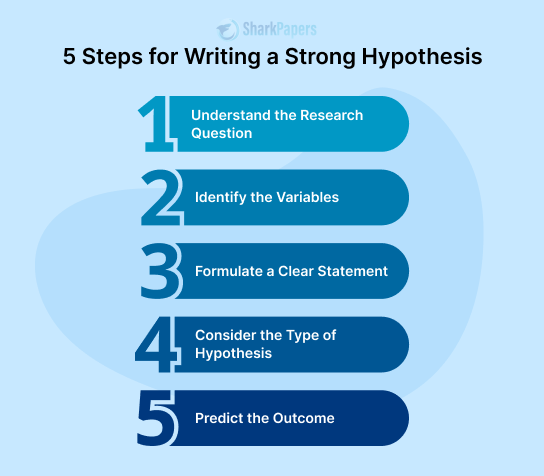
- Learn How To Cite A Research Paper in Different Formats: The Basics
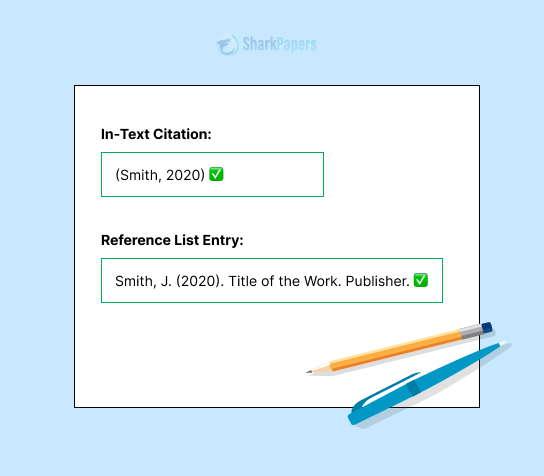
- The Ultimate List of Ethical Research Paper Topics in 2024
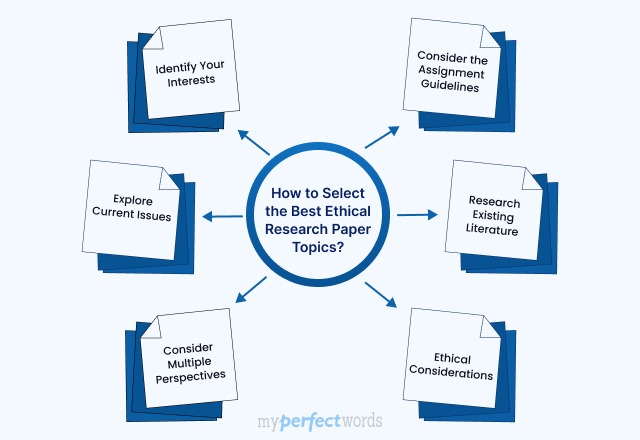
- 150+ Controversial Research Paper Topics to Get You Started
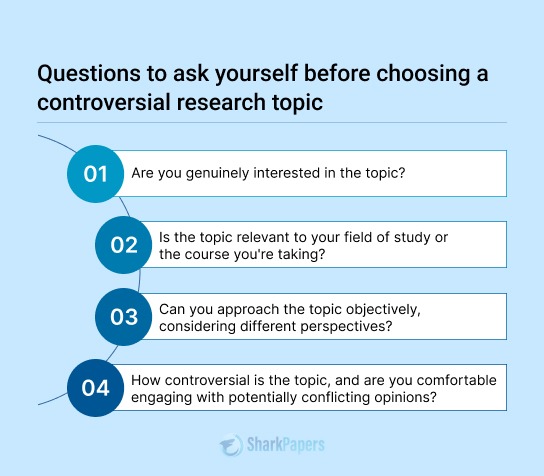
- How to Edit Research Papers With Precision: A Detailed Guide
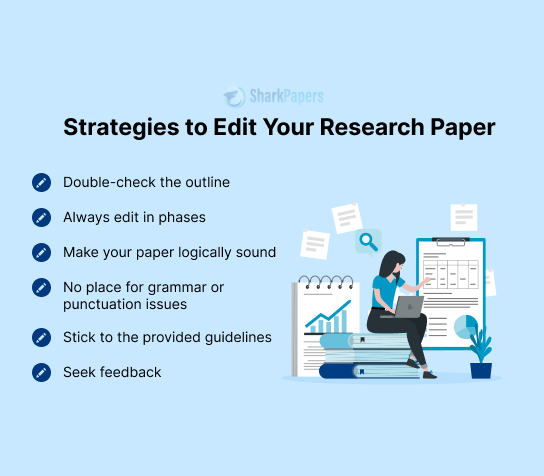
- A Comprehensive List of Argumentative Research Paper Topics
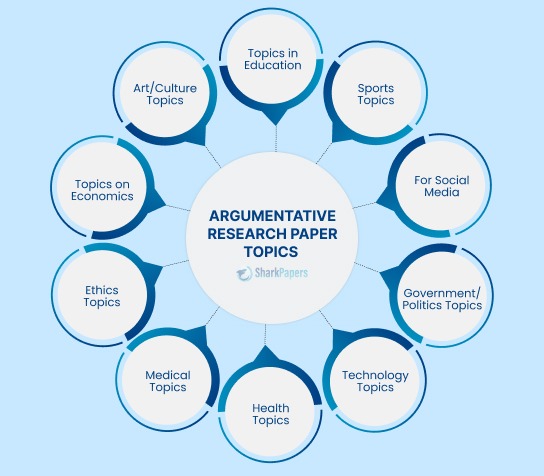
- A Detailed List of Amazing Art Research Paper Topics
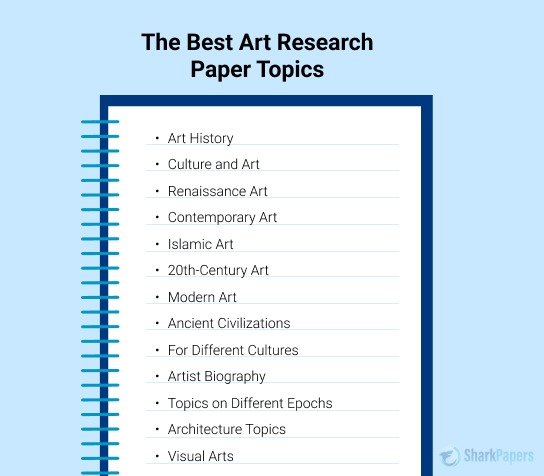
- Diverse Biology Research Paper Topics for Students: A Comprehensive List
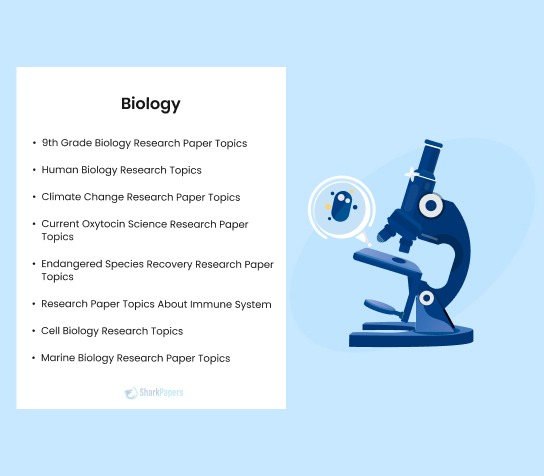
- 230 Interesting and Unique History Research Paper Topics
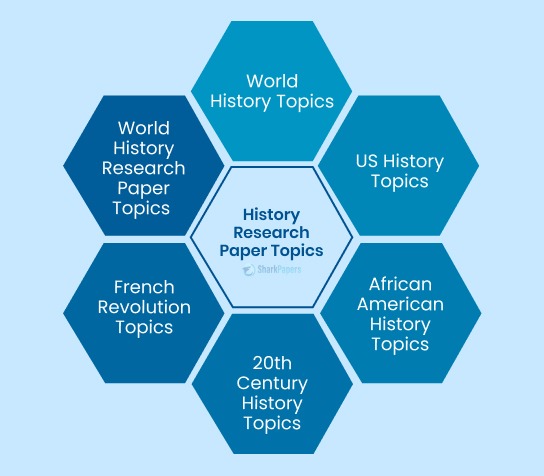
- 190 Best Business Research Paper Topics
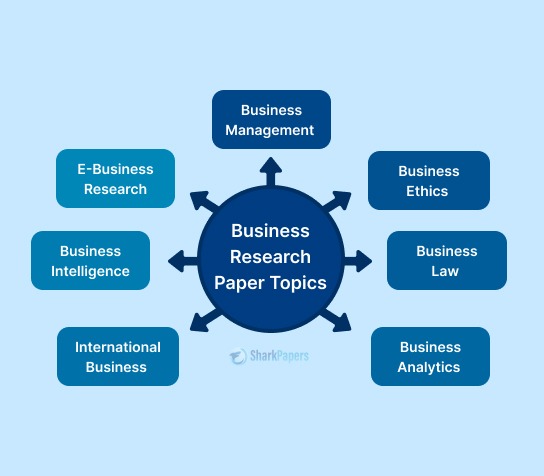
- 200+ Engaging and Novel Literature Research Paper Topics
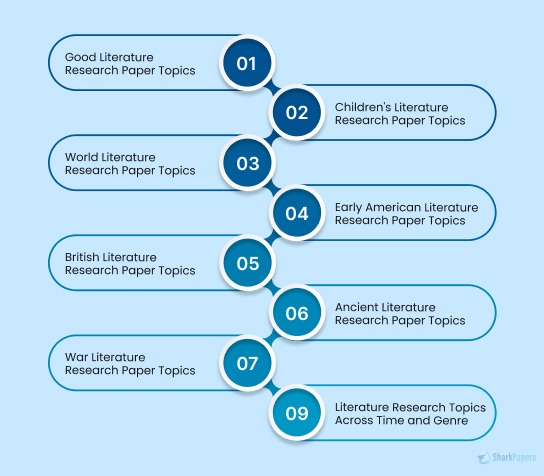
- A Guide on How to Write a Social Science Research
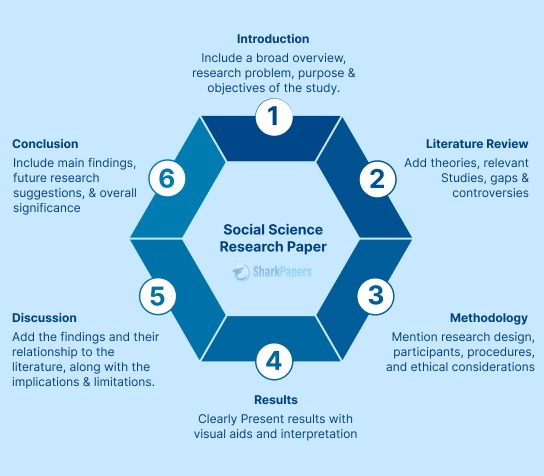
- Sociology Research Papers: Format, Outline, and Topics
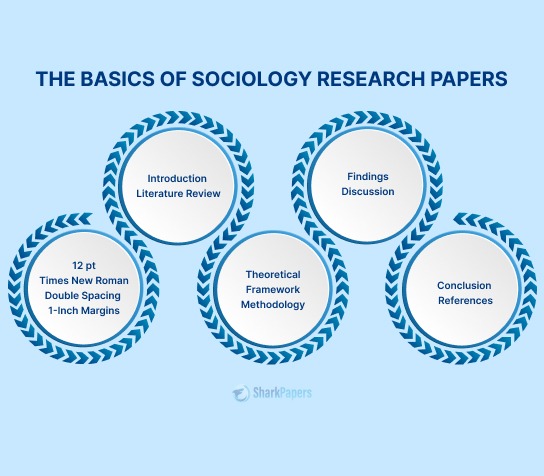
- Understanding the Basics of Biology Research Papers
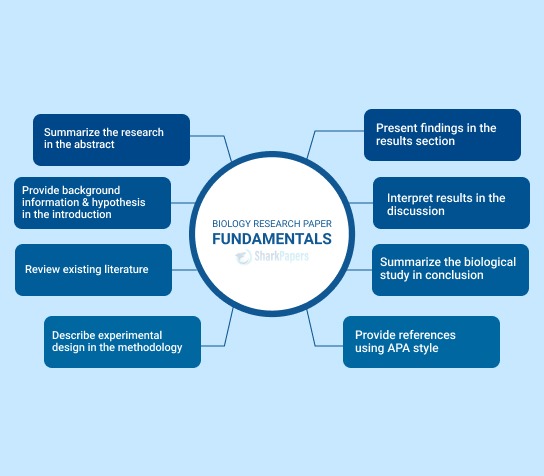
- How to Write a Psychology Research Paper: Guide with Easy Steps
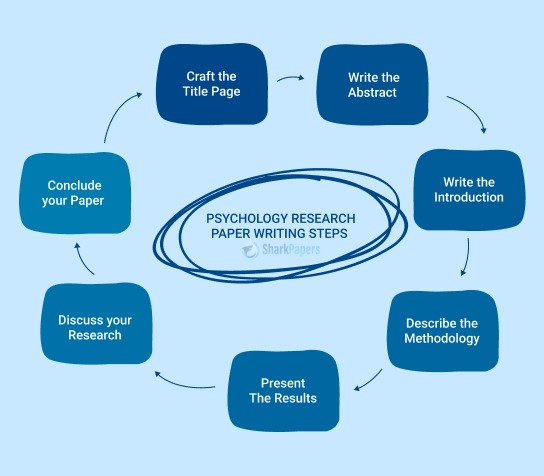
- Exploring the Different Types of Research Papers: A Guide
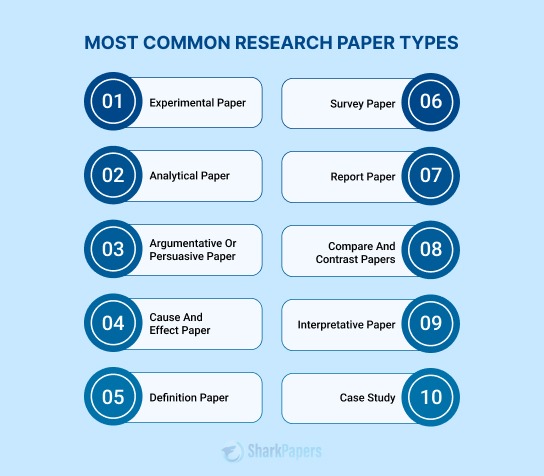
People Also Read
- types of qualitative research
- reflective essay
- how to write a summary
- how to write an essay
Burdened With Assignments?

Advertisement
© 2024 - All rights reserved
2000+ SATISFIED STUDENTS
95% Satisfaction RATE
30 Days Money Back GUARANTEE
95% Success RATE
Privacy Policy | Terms & Conditions | Contact Us
© 2021 SharkPapers.com(Powered By sharkpapers.com). All rights reserved.
© 2022 Sharkpapers.com. All rights reserved.
LOGIN TO YOUR ACCOUNT
SIGN UP TO YOUR ACCOUNT
- Your phone no.
- Confirm Password
- I have read Privacy Policy and agree to the Terms and Conditions .
FORGOT PASSWORD
- SEND PASSWORD
- Translators
- Graphic Designers
- Editing Services
- Academic Editing Services
- Admissions Editing Services
- Admissions Essay Editing Services
- AI Content Editing Services
- APA Style Editing Services
- Application Essay Editing Services
- Book Editing Services
- Business Editing Services
- Capstone Paper Editing Services
- Children's Book Editing Services
- College Application Editing Services
- College Essay Editing Services
- Copy Editing Services
- Developmental Editing Services
- Dissertation Editing Services
- eBook Editing Services
- English Editing Services
- Horror Story Editing Services
- Legal Editing Services
- Line Editing Services
- Manuscript Editing Services
- MLA Style Editing Services
- Novel Editing Services
- Paper Editing Services
- Personal Statement Editing Services
- Research Paper Editing Services
- Résumé Editing Services
- Scientific Editing Services
- Short Story Editing Services
- Statement of Purpose Editing Services
- Substantive Editing Services
- Thesis Editing Services
Proofreading
- Proofreading Services
- Admissions Essay Proofreading Services
- Children's Book Proofreading Services
- Legal Proofreading Services
- Novel Proofreading Services
- Personal Statement Proofreading Services
- Research Proposal Proofreading Services
- Statement of Purpose Proofreading Services
Translation
- Translation Services
Graphic Design
- Graphic Design Services
- Dungeons & Dragons Design Services
- Sticker Design Services
- Writing Services
Please enter the email address you used for your account. Your sign in information will be sent to your email address after it has been verified.
Writing Effective Research Paper Titles: Advice and Examples

Are you ready to submit your research paper for publication but haven't settled on a title yet? Do you have a title but aren't sure if it will be the right one for the journal editor or research database search engines? This article will help you fine tune or create an effective research paper title for your work.
Now that you have finished your research and analysis, and you're ready to take the final step before sending your work to journal editors and reviewers. The first thing journal editors and search engine results will see and show is your research paper title. Creating an effective research paper title is highly important to getting your paper in front of the right people. It is also going to be the only part of your paper that is available to everyone for free, and it will be what search engines use to index and show your work in search results. You therefore must design a clear and persuasive title that accurately represents your work.
When writing an effective research paper title, you want to ensure that the title includes all the relevant aspects of your work. Showcase those aspects in a way that entices the audience to read more. Be sure to use the nomenclature common in your field of study, because that will help your work show up in more search results and it will grab the attention of journal editors looking for articles that clearly represent the industry. If you are studying landslides, for example, you will want to include keywords relating to soil composition or grain size; if you are working on a study about organ transplants, then include the specific feature or procedure that affected successful transplants. Identify what parts of your research are going to interest your intended audience.
There are two key pieces of information that people will need to see in your paper title: the subject and the objective. Because you are already familiar with your study and its purpose, creating an effective research paper title is simply a matter of whittling down the words that describe the important aspects of your paper. The advice below will help you take steps to identify key areas of your research, organize the information, and trim it down to the right size for a title.
Develop a topic statement
To get started, consider a topic statement of your paper that includes the subject and scope of the study. The first step in building a topic statement is to ask yourself the following questions:
- What is your research paper about? "My paper is about gene therapy and how it can improve cognitive function in dementia patients."
- What was the subject of your study? "I used data from 40 dementia patients from 10 states in the US."
- What method did you use to perform your research? "I performed a randomized trial."
- What were the results? "My study showed that gene therapy improved cognitive function in those who received the treatment."
Once you have answered those questions (such as in the example answers above), make a list of the keywords you used. For this example, those keywords would include the following:
- gene therapy
- cognitive function
- 40 dementia patients
- improved cognitive function
- 10 states in the US
- randomized trial
Then, create your topic statement using those keywords. It might read something like this:
"This study is a randomized trial that investigates whether gene therapy improved cognitive function in 40 dementia patients from 10 states in the US. The results show improved cognitive function in those who received the treatment."
This statement has 36 words — too long for a title. However, it does contain the main required elements: the subject and the objective. It also includes a summary of the results, which can be used to increase the persuasive nature of the title. If you are writing this down on paper, it may be helpful to underline or circle the keywords you used in the statement, as this will help you visually see how the keywords work together in your statement.
Trim the statement
The next step is to remove all unnecessary words to create a working title. Unnecessary words include elements that make the sentences complete sentences. Also remove words that are not central to your study or that would not be used in a research database search.
" This study is a randomized trial that investigates whether gene therapy improved cognitive function in 40 dementia patients from 10 states in the US. The results show improved cognitive function in those who received the treatment ."
Next, take those words and move them around to form a new phrase. This may take a few tries to get it right, but it is worth the time.
"A randomized trial investigating whether gene therapy improved cognitive function in 40 dementia patients from 10 states in the US showed improved cognitive function."
This sample now has 24 words. We still need to get it down to the ideal 15 or fewer total words, with just the exact information journal editors will want. One way to do this is to use the keywords at the beginning and end of your title. Remove any irrelevant facts that other researchers will not be searching for. For example, the method you used is not usually the most searched-for keyword.
" A randomized trial investigating whether gene therapy improved cognitive function in 40 dementia patients from 10 states in the US showed improved cognitive function. "
The final result may be something like this:
"Investigating the impact of gene therapy on cognitive function in dementia patients"
The resulting title has 13 words, had the main action at the beginning, and the main subject of the study at the end. This is a good example of how to create an effective research paper title that will increase journal editors' and reviewers' interest, and it may even help your paper receive more citations down the road.
Main tips to remember
If you are working on your first research paper title, the process can seem intimidating. Even with the process outlined above, creating the best research paper title possible for your work can be difficult and time consuming. Be sure to set aside a good amount of time to developing your title so that you don't feel rushed. Some writers go through 20 or more iterations before they arrive at a title that achieves effectiveness, persuasiveness, and clarity of purpose all in one.
In addition to the above process, keep the following main tips in mind when writing an effective research paper title:
- Write your paper and abstract first, then work on your title. This will make the process much easier than trying to nail a title down without a full, finished paper to start from.
- Keep your title short! Do not include more than 15 words.
- Do not use a period at the end of your title.
- Be sure that the keywords you use truly represent the content of your paper.
- Do not use abbreviations in your title.
- Include all essential key terms from your paper. This ensures your paper will be indexed properly in research databases and search engines. If you are unsure of the best keywords to use, talk to an academic librarian at your institution. They can help you identify keyword and search trends in your research field.
Examples of research paper titles
The lists below illustrate what effective and ineffective research paper titles look like. Use these examples to help guide your research paper title.
Effective titles
- Nurses on the Move: A Quantitative Report on How Meditation Can Improve Nurse Performance
- Correction of the ion transport defect in cystic fibrosis transgenic mice by gene therapy
- Landslide mapping techniques and their use in the assessment of the landslide hazard
- HLA compatibility and organ transplant survival: Collaborative Transplant Study
Ineffective titles
- Meditation Gurus
- The landslide story
- Landslide hazard and risk assessment
- Pharmacodynamics of oral ganciclovir and valganciclovir in solid organ transplant recipients
No matter what kind of field you are doing research in, you have the opportunity to create an amazing and effective research paper title that will engage your readers and get your paper in front of the journal editors and reviewers you want. By taking the time to go through the title development process, you will finish your work with a title that matches the work outlined in your research paper.
Header photo by Stokkete .
Related Posts

How Does a Hypothesis Differ From a Research Question?

The Future of Academic Publishing: Emerging Trends You Should Know
- Academic Writing Advice
- All Blog Posts
- Writing Advice
- Admissions Writing Advice
- Book Writing Advice
- Short Story Advice
- Employment Writing Advice
- Business Writing Advice
- Web Content Advice
- Article Writing Advice
- Magazine Writing Advice
- Grammar Advice
- Dialect Advice
- Editing Advice
- Freelance Advice
- Legal Writing Advice
- Poetry Advice
- Graphic Design Advice
- Logo Design Advice
- Translation Advice
- Blog Reviews
- Short Story Award Winners
- Scholarship Winners

Elevate your research paper with expert editing services
Research Paper Guide
Research Paper Title
Crafting a Winning Research Paper Title: A Complete Guide
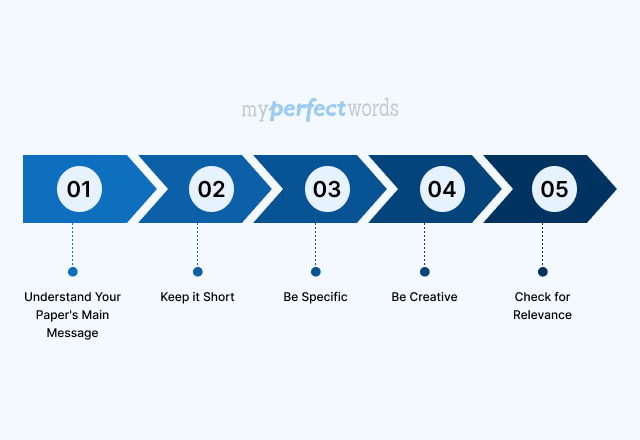
People also read
Research Paper Writing - A Step by Step Guide
Research Paper Examples - Free Sample Papers for Different Formats!
Guide to Creating Effective Research Paper Outline
Interesting Research Paper Topics for 2024
Research Proposal Writing - A Step-by-Step Guide
How to Start a Research Paper - 7 Easy Steps
How to Write an Abstract for a Research Paper - A Step by Step Guide
Writing a Literature Review For a Research Paper - A Comprehensive Guide
Qualitative Research - Methods, Types, and Examples
8 Types of Qualitative Research - Overview & Examples
Qualitative vs Quantitative Research - Learning the Basics
200+ Engaging Psychology Research Paper Topics for Students in 2024
Learn How to Write a Hypothesis in a Research Paper: Examples and Tips!
20+ Types of Research With Examples - A Detailed Guide
Understanding Quantitative Research - Types & Data Collection Techniques
230+ Sociology Research Topics & Ideas for Students
How to Cite a Research Paper - A Complete Guide
Excellent History Research Paper Topics- 300+ Ideas
A Guide on Writing the Method Section of a Research Paper - Examples & Tips
How To Write an Introduction Paragraph For a Research Paper: Learn with Examples
Writing a Research Paper Conclusion - Step-by-Step Guide
Writing a Thesis For a Research Paper - A Comprehensive Guide
How To Write A Discussion For A Research Paper | Examples & Tips
How To Write The Results Section of A Research Paper | Steps & Examples
Writing a Problem Statement for a Research Paper - A Comprehensive Guide
Finding Sources For a Research Paper: A Complete Guide
A Guide on How to Edit a Research Paper
200+ Ethical Research Paper Topics to Begin With (2024)
300+ Controversial Research Paper Topics & Ideas - 2024 Edition
150+ Argumentative Research Paper Topics For You - 2024
How to Write a Research Methodology for a Research Paper
Ever find it hard to come up with a catchy title for your research paper? You're not alone! Many people struggle with creating titles that grab attention and show what their work is about.
It can be frustrating because your title is like a first impression. If it's not interesting, people might ignore your research.
But no worries!
In this blog, we'll give you practical tips and examples to make sure your research paper title stands out.
Whether you're a beginner or an expert, we want to help you write research paper titles that would make others excited about your work!
So, let’s get started.
- 1. What is a Research Paper Title, and Why Does it Matter?
- 2. How to Write a Good Research Paper Title in 5 Steps
- 3. Step 2: Keep it Clear and Concise
- 4. Research Paper Title Examples
- 5. Tips for Writing an Effective Research Paper Title
What is a Research Paper Title, and Why Does it Matter?
A research paper title is like the name tag for your work. It tells people what your research paper is about. It's the first thing readers see, and it's important because it helps them decide if they want to read more.
Think of it like this: Have you ever picked up a book because the title sounded interesting? It's kind of the same idea. A good title grabs attention and makes people curious about what's inside.
In the world of research, a well-crafted title is crucial because it sets the stage for your whole paper.

Tough Essay Due? Hire Tough Writers!
Key Characteristics of a Good Research Paper Title
Here are some important factors that create an engaging and interesting research paper title:
- Clarity and Precision: Clearly conveys the main idea.
- Relevance to Content: Reflects core focus and findings.
- Conciseness: Keeps title brief and to the point.
- Keywords and Phrases: Includes important search keywords.
- Captivating Language: Engages interest without sacrificing accuracy.
- Reflects Paper's Tone: Matches the research paper's tone and style.
How to Write a Good Research Paper Title in 5 Steps
Writing an effective research paper title doesn't have to be difficult. Follow these five straightforward steps to craft a title that not only reflects your research but also captures the reader's interest.
Step 1: Understand Your Paper's Main Message
Think of your research as a big idea or a story. Imagine it as the most important thing you want to share with others.
Ask yourself: What's the main thing or research problem I want people to know about my research?
Once you're clear on this, you're ready to move on.
Step 2: Keep it Clear and Concise
When making your title, make it short and simple. Don't use too many words or make it confusing.
The goal is to make it easy for people to understand what your paper is about right away. Think of it like telling a quick and clear story with your title!
Step 3: Be Specific, Not Too General
When writing your title, make sure it talks about your research and not just anything general. Don't use titles that could fit lots of different studies.
Being specific helps people know exactly what your paper is going to tell them. It's like giving them a clear roadmap to your research!
Paper Due? Why Suffer? That's our Job!
Step 4: Inject a Hint of Creativity or Intrigue
Make your title a little exciting! Use engaging words or ask a fun question to make people curious. Imagine your title as a little mystery that makes them want to learn more
Step 5: Check for Keywords and Relevance
Think about the words people might use when searching for research like yours. Use those words in your title to help people find your work.
Including relevant keywords can improve the visibility of your paper in searches.
Adding a Research Paper Subtitle
A research paper subtitle is like an extra description that comes after the main title. It gives more details about what your research is about.
Adding a subtitle is a choice, but it can be helpful. If your main title is short and you want to say more about your research, a subtitle is a good idea.
It's like a bonus that provides extra information for readers. Consider using a subtitle when you want to give a bit more insight into your research topic.
Research Paper Title Examples
Check out the examples below and see how they perform in front of different factors:
Tips for Writing an Effective Research Paper Title
Follow these tips to make your research paper title engaging and attention-grabbing:
- Add important words related to your research for better search results.
- Make your title brief and clear to convey your research focus effectively.
- Use words that grab attention and spark curiosity about your study.
- Craft a title that anyone, whether an expert or newcomer, can understand.
- Aim for a title that's not too general or too technical, striking the right balance.
In conclusion,
Writing a standout research paper title is a crucial step to ensure your work gets the attention it deserves. Following the simple tips shared in this guide can help you create a title that is clear, engaging, and perfectly aligned with your research focus.
Remember, your title is the first thing readers see, so making it count is key!
However, if you need writing assistance, MyPerfectWords.com is here for you. Our skilled writers are not only ready to help with writing compelling titles but can also write custom research paper just for you.
So don’t wait! Reach out to our essay writing service today and take your academic writing to the next level!

Write Essay Within 60 Seconds!

John K. is a professional writer and author with many publications to his name. He has a Ph.D. in the field of management sciences, making him an expert on the subject matter. John is highly sought after for his insights and knowledge, and he regularly delivers keynote speeches and conducts workshops on various topics related to writing and publishing. He is also a regular contributor to various online publications.

Paper Due? Why Suffer? That’s our Job!

Keep reading

How To Write A Research Paper
Research Paper Title

How to Write a Good Research Paper Title
10 min read
Published on: Jan 5, 2024
Last updated on: Jan 30, 2024

People also read
How to Write a Research Paper Step by Step
How to Write a Proposal For a Research Paper in 10 Steps
A Comprehensive Guide to Creating a Research Paper Outline
Types of Research - Methodologies and Characteristics
300+ Engaging Research Paper Topics to Get You Started
Interesting Psychology Research Topics & Ideas
Qualitative Research - Types, Methods & Examples
Understanding Quantitative Research - Definition, Types, Examples, And More
Research Paper Example - Examples for Different Formats
How To Start A Research Paper - Steps With Examples
How to Write an Abstract That Captivates Your Readers
How To Write a Literature Review for a Research Paper | Steps & Examples
Types of Qualitative Research Methods - An Overview
Understanding Qualitative vs. Quantitative Research - A Complete Guide
How to Cite a Research Paper in Different Citation Styles
Easy Sociology Research Topics for Your Next Project
200+ Outstanding History Research Paper Topics With Expert Tips
How To Write a Hypothesis in a Research Paper | Steps & Examples
How to Write an Introduction for a Research Paper - A Step-by-Step Guide
How to Write a Conclusion for a Research Paper in 3 Simple Steps
How to Write an Abstract For a Research Paper with Examples
How To Write a Thesis For a Research Paper Step by Step
How to Write a Discussion For a Research Paper | Objectives, Steps & Examples
How to Write the Results Section of a Research Paper - Structure and Tips
How to Write a Problem Statement for a Research Paper in 6 Steps
How To Write The Methods Section of a Research Paper Step-by-Step
How to Find Sources For a Research Paper | A Guide
Share this article
In scholarly writing, the title plays a subtle yet pivotal role. Ever wondered how a simple string of words can make or break a research paper's impact?
Your research paper's title serves as the initial point of contact for your reader, forming their first impression of your work. Therefore, careful consideration of your title is crucial.
There are fundamental principles to bear in mind: your title should be informative, attention-grabbing, and contextually fitting.
This guide provides a detailed view of these essential qualities, by looking at the steps to write a research paper title. We'll break down what makes a great title.
So let’s get started!
On This Page On This Page -->
What is Research Paper Title, and Why is it Important?
A research paper title is a concise and informative heading that encapsulates the main theme or focus of a research study. It serves as the first point of contact between the reader and the research paper, providing a peek into the purpose of the study.
It is important because the research paper title tells readers what the study is about almost instantly.
A good title not only grabs attention but also helps in finding the research online. It shows the professionalism of the study and makes it easier for everyone to understand and engage with the research.
So, a well-crafted title is like a guide that leads readers to the core of the research.
Characteristics of a Good Research Title
According to rhetoric scholars Hairston and Keene , creating an effective paper title involves achieving the goals outlined below:
- Content Preview: A good title gives a glimpse of the research content.
- Engagement Factor: An effective title sparks reader interest.
- Tone Alignment: It reflects the scholarly tone of the paper.
- Keyword Integration: Includes essential keywords for better searchability.
- Prioritize Clarity: Use clear, concise language for broad understanding.
- Embrace Conciseness: Keep titles brief, omitting unnecessary details.
- Ensure Specificity: Include unique details to distinguish the research.
With these 7 characteristics of a research title in mind, let's now explore the steps to craft an ideal research paper title.
How to Write a Research Paper Title in 5 Steps
In the following sections, we'll walk through a five-step process designed to help you create a title that is truly impressive.
Step 1: Define the Core Elements of Your Research
Before crafting your research paper title, it's essential to answer key questions about your study. These questions help you identify the main focus and key components of your research paper. Consider:
- Research Topic: What is the primary subject of your study?
- Research Problem or Question: What issue are you addressing, or what question are you seeking to answer?
- Methodology: What methods or approaches did you use in your research?
- Results/Findings: What are the main outcomes of your study?
Step 2: Identify Essential Keywords
Identify significant keywords related to your research paper. These terms will play a crucial role in creating a title that effectively communicates your study's focus.
Step 3: Constructing a Research Title Using Keywords
Combine the identified keywords into a concise and descriptive research paper title. Weave together the essential elements of your study while maintaining clarity and relevance.
The sentence above, describing the research on smoking cessation programs, is undoubtedly too lengthy for a research paper title . Therefore, the forthcoming steps will involve refining and succinctly polishing the title for clarity and conciseness.
Step 4: Develop a Working Research Title
To create a working title, remove elements that make it a complete sentence but keep everything important to the study. Delete unnecessary and redundant words not central to the research or likely excluded from a database search.
Original Working Title:
Refined Title:
Note: The goal is to shorten the title to 16 words or fewer, making it concise and effective for a research paper.
Step 5: Trim Unnecessary Words and Phrases
Remove any nonessential words and phrases from your title. The number of subjects studied and exact outcomes may not be crucial, and detailed methods can be omitted for conciseness. Focus on key terms for database search optimization.
Final Refined Title:
Adding a Research Paper Subtitle
If your title needs additional details about your methodology or sample, consider adding a subtitle after a colon.
Research Paper Title Examples
Let's start by examining research title examples suitable for students. We will explore the basic formats for research paper title pages, including MLA and APA styles.
Research Paper Title Page MLA
Title Page For A Research Paper APA Style

Scientific Paper Title
Here are 5 examples of research titles for scientific papers:
Tips on Formulating a Good Research Paper Title
When creating a title for your research paper, consider the following general tips to capture the reader's attention and effectively convey the purpose of your study:
- Summarize your research in the fewest possible words to maintain clarity and reader engagement.
- Incorporate essential keywords that researchers working in your field are likely to use.
- Use compelling and attention-grabbing language to make your title stand out.
- Ensure your title accurately captures the purpose of your research, conveying the central question or objective.
- Clearly define the scope of the study in the title, indicating the specific focus of your research.
- Consider phrasing your title in the form of a question if it enhances the intrigue and aligns with the nature of your research.
- Prioritize readability and clarity to make your title easily understandable for a broad audience.
- Optimize your title for search engines by including relevant keywords that researchers might use when seeking similar studies.
- Minimize the use of field-specific jargon that may alienate readers unfamiliar with your subject.
- Ensure the title summarizes the core findings or contributions of your research.
Research Paper Title Checklist
Here's a checklist table to guide you on how to write a research paper title:
In conclusion , writing an effective research paper title is a vital skill that demands accuracy, clarity, and engagement. Prioritize conciseness and specificity while ensuring relevance to the research content. Remember to integrate essential keywords for enhanced searchability.
If you find yourself struggling, fear not. CollegeEssay.org is here to assist. With a wealth of experience aiding scholars worldwide, our professional writing service ensures meticulously crafted titles that resonate with your research.
Connect with our research paper writing service for expert assistance â let us elevate your paper's impact and resonance.
Can abbreviations or acronyms be used in the research paper title?
While sparingly acceptable, it's advisable to initially use full terms in the title for clarity. Introduce abbreviations later in the paper to avoid potential confusion for readers unfamiliar with the terms.
Is it advisable to formulate the research paper title as a question?
Crafting the title as a declarative statement is preferable. It provides a clear indication of the study's main focus and findings, enhancing reader engagement and comprehension.
Should the research paper title be in sentence case or title case?
Follow the specific style guidelines recommended by your institution or the publisher. Some styles prefer sentence case (where only the first word and proper nouns are capitalized), while others recommend title case (where major words are capitalized). Consistency is key to maintaining a polished appearance.
Is it permissible to change the research paper title after submission?
Post-submission changes to the title may be challenging, so it's crucial to carefully finalize and review the title before submitting the paper to avoid complications in the publication process.
Is it beneficial to include specific keywords in the research paper title?
Yes, incorporating keywords relevant to your study increases the discoverability of your research. It helps search engines, databases, and readers quickly identify the core themes of your paper.
John K. (Research)
John K. is a professional writer and author with many publications to his name. He has a Ph.D. in the field of management sciences, making him an expert on the subject matter. John is highly sought after for his insights and knowledge, and he regularly delivers keynote speeches and conducts workshops on various topics related to writing and publishing. He is also a regular contributor to various online publications.
Paper Due? Why Suffer? That’s our Job!

Keep reading

Legal & Policies
- Privacy Policy
- Cookies Policy
- Terms of Use
- Refunds & Cancellations
- Our Writers
- Success Stories
- Our Guarantees
- Affiliate Program
- Referral Program
- AI Essay Writer
Disclaimer: All client orders are completed by our team of highly qualified human writers. The essays and papers provided by us are not to be used for submission but rather as learning models only.

How to Title an Essay
Well, neither does your teacher, professor, or boss. The difference is that they don’t have a choice and have to. A good title helps you stand out, and that’s part of the reason why a title is so important. Just knowing the right way to title an essay can boost your grades!
A good title has to grab the reader’s attention. It’s the first thing someone sees, so think of it as your first opportunity to impress. The title needs to be catchy but focused on the content of your essay. A good title is simple yet informative. Sounds tough? Don’t worry, this article will cover all you need to know about how to title an essay perfectly.
How to Choose a Good Title for an Essay
A good title makes a reader think “Yes! I want to read the rest of this!” but a title also has to accurately reflect the content of the paper. It’s not just students, one of the differences between an average writer and an expert is how well they can write a title. If you want to work in social media, advertising, or any kind of content writing, learning how to write a title for an essay is an essential skill to have.
There are two main components of a good essay title.
Catchy Hook
Anyone that’s ever written anything knows that having a catchy hook in your introduction is a requirement, but most people forget that you can include a hook in the title itself. Remember, you want to stand out and differentiate yourself from the competition.
There are a few places to hunt for keywords to fit into your title. The essay prompt or research question is a good place to start but using words in your thesis statement ensures that your topic accurately reflects the main point of your essay. The use of keywords like this ensures that your title reflects what the essay is about. You’ll know you’ve found the right keywords if they seem like two or three word summaries of the main point of your essay.
How to Come up With a Title for an Essay
How to create a title for an essay in a way that makes it stand out from the crowd requires creativity, hard work, and time. That may seem like a lot just for a title, but it’s worth it. Follow these bits of advice and craft the perfect title!
Write your title at the end
Just because the title is the first thing someone reads doesn’t make it the first thing you should write! Coming up with a good title is tough and requires a deep understanding of the content of the paper. That means it’s usually better to write the title at the end after you’re done with a couple of drafts of your paper.
Though it’s good to write according to a plan, often, new thoughts can take your essay in an unexpected direction, this is another reason why its good to start with a working title as a placeholder and go back to write the final title at the end.
Use your thesis
A good title hints at what the thesis statement will be. A thesis statement is a summary of the main argument and purpose of the paper, so use your thesis statement as a source of inspiration for your title. This makes sure that your title has predictive power since it’s drawn from the thesis statement itself.
Simple but not too simple
There is no rule about how long a good title should be - there are benefits to short titles and benefits to long titles. Short titles are direct and clear and better suited for simpler, straightforward essays. Longer titles may be more appropriate for complex or very specific essays. No matter what though, make sure that your titles are easy to understand.
Make sure your title is specific
A title that’s too general may seem like it’s describing your essay, but it isn’t. Is your essay just about “Mobile Gaming in 2020” or is it about “The Impact of Coronavirus Lockdowns on the FTP Mobile Game Industry”? The first title may be short and to the point, but it doesn’t give enough specific information about the content of the essay. Remember, a good title hints at what the essay is going to be about, but also intrigues the reader. Generic and broad titles don’t do that.
Your title needs to be believable
Just because a lot of titles you see on the internet are clickbait, doesn’t mean that you need to write an over the top title as well. Especially if you’re writing a paper for academia, make sure your title doesn’t over-promise what you’re going to cover in the essay.
Write your title in the active voice
Write your title in the active voice, that is, the subject acts upon the verb rather than the subject receives a verb's action. Writing in the active voice uses fewer words and is more concise and engaging - perfect for writing a catchy title.
Rewrite famous movies, books, quotes, phrases, quotations, etc.
Creativity is an important element of coming up with a catchy title. If you can find a famous phrase that you can rework into the perfect title for your essay, go for it! For example, a paper about mitosis and meiosis (cell division) can be titled “Live Long and Prosper”.
Match the style and tone of your essay
It wouldn’t make sense to have an amusing title for an essay about a refugee crisis. Make sure that your title reflects the tone of your essay. Some titles work better depending on the essay style. For example, the title of a persuasive essay would be different than the title of a reflective essay.
Who’s the audience?
Of course, how you title an essay depends on who you’re writing it for. A blog post targeted towards your friends or prospective followers is going to have a different title than an essay for your stuffy old history teacher. Your young science teacher who loves memes and blows up things in class might appreciate a different type of title. A university application essay usually needs to be more formal. Try and find out as much as you can about who is going to read your essay and cater both your essay and title to them.
To use or not to use: Colons in essay titles
Using a colon to separate an essay title into two sections used to be the norm. It became so common in fact, that now they are considered cliche. There may be a few occasions when using a colon is just perfect, but avoid overusing it. The best way to use a colon is by inserting a creative phrase or clever quote behind the colon. For example, the title of this section.
Use evocative imagery
An easy way to make your title catchy is by using imagery. If you can make the reader imagine something in their mind based on your title, you’re starting off with a win. “Stepping into the void: The first spacewalk” is a much better title than simply “The first spacewalk.
These tips should help you answer how to come up with an essay title!
Struggling on how to Title an Essay Homework?
Get your assignments done by real pros. Save your precious time and boost your marks with ease.
Common Titling Mistakes
The deadline is racing towards you and you still don’t have a title! After panicking and writing whatever pops into your head, check to make sure you don’t do any of the following.
- Either bold your title or underline it - Doing both is overkill and rather than stressing the title, makes it look cluttered and messy.
- Don’t make your title too short - A good title should let the reader predict what the essay is going to be about.
- Don’t make your title too long.- A long title might give more information about the essay, but it can be cluttered and overloaded with dense information.
- Don’t use slang, jargon, or abbreviations - You want to make sure that the title is clear. If the teacher has to look up a word in your title, you’re starting off badly.
- Don’t get too personal - Your title should entice the reader. Whatever strong arguments you want to make should be made in the body of the essay.
Make sure your title reflects the content of the essay - This often happens when the title is written first and then the essay. Start with a placeholder title and after the essay is done, work on creating a title that accurately reflects the main purpose of the essay.
Improved Essay Titles
You might have an idea about what the title should be as you’re working on your essay, but there are still things to watch out for. Sometimes the perfect title pops into your head fully formed, but more often than not, a good title takes thought, effort, time, and several rewrites. Make sure to set aside some time just to work on the title.
An Exploration of the Best Way to Spend Time During Lockdown Based on Personal Experience
This title might do a good job of explaining what the essay is about but it’s too long and wordy.
Better title: My Lockdown Chronicles: What to do With Unexpected Free Time
An Analysis of Avengers: Endgame
This title is too broad. The topic is interesting but there’s no hook to engage the reader.
Better title: Why Avengers: Endgame is Modern Storytelling at its Best
Badly Breaking the myths about drug overdose
This title seems forced. The topic is very serious, so trying to use a pun in the title can come across as incongruent. It also depends on the reader knowing the show Breaking Bad and making the connection. Depending on the audience, this might be the perfect title though, so make sure to consider your audience when writing and titling an essay.
Better Title: An Analysis of Drug Overdose Deaths in the 2010s
The Best Colorful Birds
This title doesn’t give any specific information or talk about what the reader can expect to learn from the essay.
Better Title: Why Birds of Paradise Evolved to Become the Brightest Birds
Did you like our inspiring Essay Title Guide?
For more help, tap into our pool of professional writers and get expert essay editing services!
Essay Title Ideas
Catchy essay title examples
A catchy title can start your reader off intrigued, entertained, and overall, just in a positive state of mind. That’s a good way to get noticed and boost your grade on the essay! Here are some examples of attention-grabbing essay titles.
Underage Romance: An Analysis of the Ages of William Shakespeare’s Characters
An Alien Among Us: What if Superman Was Real?
The Day the Planet Caught a Virus
The Rise and Fall of the Alpha Male
Memes Before the Internet
College Essay Title examples
When answering a college essay, make sure you read and follow the instruction carefully. Not following the often very strict requirements is. Generally speaking the tone of the essay, and therefore the title should be more serious but don’t be afraid to let your personality come through. Have a look at these examples.
Why Building Houses in a Third World Country was Unsatisfying
The Daily Struggles of an International Student
Energy Equals MC Hammer: My First Day of Dance Class
A Showdown Between William Shakespeare and Hamilton
Mahatma Gandhi’s Disobedience Without Violence
Argumentative Essay Title Examples
An argumentative essay is an opportunity to convince the reader about your view on a topic. Since the goal of an argumentative essay is to make an argument using facts, research, and logic, your title should state your position on the issue. These examples should steer you in the right direction.
Artificial Intelligence Will Not Matrix Humanity
The Best Soup Is Your Grandmother’s
Oh, the Humanity: Why the Death Penalty Should Be Abolished
Scientific Backing for the Benefits of Video Games
Trial and Error: Better Than the Scientific Method?
Persuasive Essay Title Examples
A persuasive essay appeals to emotions to influence the reader. The main difference between an argumentative essay and a persuasive essay is that an argumentative essay uses facts and research while a persuasive essay relies on emotional appeals. How do these title examples make you feel?
A Glamorous Path to Self Hatred: Modern Beauty Standards
Surreptitious Racism and Why It’s More Difficult to Erase
Saving the Planet, One Tree at a Time
The Natural Way to Heal: Ayurvedic Medicine
Testing the Uneducated: Medical Testing in Third World Countries
Narrative Essay Title Examples
Narrative essays can be thought of as short stories. They ask a writer to share an experience clearly and concisely while making a clear point. The titles of these essays can be more playful and ambiguous. Take a look at some examples.
The Pleasure of Discovering an Amazing New Anime
A Missed Opportunity: Why I Didn’t Attend My Uncle’s Funeral
When my Teacher Became a Father Figure
How Being Bullied Made Me a Kinder Adult
Bloody Victory: My First Mixed Martial Arts Win
Research Paper Title Examples
Research papers test your ability to find credible sources and synthesize complex information into a well-structured format. These are almost exclusively academic, and as such, have formal titles. The first versions of these titles often end up being very long, so spend some time whittling away any extra information. Take a look at the examples below.
The Effects of Caffeine on Attention and Sleep
Experimental Evidence for the Use of Music in Boosting Agricultural Yields
Not Stinky: Bathing Culture in Ancient China
The Impact of Western Media on 13 to 30-Year-Olds in Asia
The Marvel Cinematic Universe: A Guide on How to Plan Ahead
English Essay Titles Examples
Writing a title for an English essay doesn’t have to be boring. In fact, if you’re studying literature, you should take the opportunity to flex your creative writing skills. Don’t overdo it though! Titles still need to be predictive, comprehensible, and engaging. Examples down below.
Akala: A Modern Day Shakespeare
Why We’re Already Living in the Brave New World
The Impact of Foreign Writers on Modern English Literature
The Terrifying Origins of Folk Tales
The Times They Are a-Changing: Analyzing Mark Twain’s Writings in 2019
Quick Recap
A great title piques the interest of the reader and starts their journey at a high point. Whether it’s online or for school, you have to find a way to stand out from the very beginning. A good title takes time and effort, but coming up with the perfect title can also be fun, and it absolutely makes a difference to your grade.
Ask these questions to make sure that your title is good.
- Does the title predict what the paper is about?
- Does the title use keywords effectively?
- Does the title accurately reflect the tone of the essay?
- Is the title appropriate for the audience?
- Is the title interesting?
Remember these tips when brainstorming an essay title.
- Think of an interesting hook
- Use keywords (Your thesis is a good place to look)
- Write your title after you’ve written the essay, not before
- Simple but not too simple, it should be predictive
- Use as few words as possible while being informative and interesting
- Keep it believable
- Match the tone and style of your essay
- Think about the audience
- Use imagery
- Rework a popular phrase
- Use active voice
- Avoid unnecessary words and jargon
- Avoid abbreviations
The title of your essay can make or break your grade, so it's important to choose one that is attention-grabbing and relevant to your topic. If you're struggling to come up with a good title, don't worry! Studyfy has compiled a list of over 300 essay topics to inspire you. And if you still need help with your essay, including proofreading and editing, or if you need to " pay someone to do my essay ", Studyfy's team of experts is always available to help. They offer dissertation writing services , research paper service , and even have an admission essay writer to help you get into your dream school. Just reach out to them for all your academic needs!
Featured Posts
How to write a term paper.
.png)
How To Make An Essay Longer
.png)
How to Write a Dissertation

How to Write an Essay

How to Write a Research Paper
.png)
How to Write a Discussion Post

Studying / Writing Tools
Essay Title Generator

Essay titles are not the easiest things to come up with on your own. We know. That’s why we developed our Essay Title Generator to help you create the title your paper deserves. How does it work? Simple. Just enter the topic you’re interested in researching and a random title will be generated from our database based on the parameters you provide.
Why start with a title? Easy. The best way to start your research is to identify a specific focus within your topic—and that’s what a title does. It tells precisely what your paper is going to be about. So if you’re lost and confused about where to start, try our essay title generator.
How to Use our Essay Title Generator
1. Select your "essay topic" or "type of essay" from drop down menu 2. Click the button for "Generate Essay Title." 3. Read the title that our auto-generating system produces. 4. Want more? Click the button for "Generate More Essay Titles." 5. That’s all there is to it! Use our title to help get yourself started on your research.
Essay Title:
Topic not listed in drop down? Search your specific topic
Essay Titles
Why would generating an essay title help you get started in your research? Think about it. Picking a focus for your paper is no walk in the park. How do you whittle down a broad topic to a narrow subject? Well, here’s a way! Try thinking of a snappy title first and going from there! Of course, not everybody is good at whipping up a creative title to get the juices flowing. That’s why we’re here to help.
All you have to do is select your topic from the drop down menu. If you have more than one topic in mind, use the generator more than once and get a bundle of titles to pick from. If you go berry-picking you don’t head out with a basket and come back with one berry, do you? NO! You fill that basket up with as many berries as you can find, then you sort them out, select the best ones, and make yourself a delicious berry pie!
That’s what we’re doing here with our essay title generator. We’re helping you to create a great essay by helping you take the first step in that process. Get your title, get your engine revving, and get going!
Important! Don’t stress—no one likes stress, and it doesn’t help anyone—ever! So leave your stress at the door and see for yourself how simple this can be. No more worries that you can’t think of anything, no more fretting over whether you’ll ever be able to focus and create a thesis. This is easy. You tell us the topic. We tell you a title idea. Want another? Click the generator button again. Need another after that? Keep clicking. Our database is filled with great titles that will launch you into the stratosphere of great ideas quick than a SpaceX Falcon rocket. So strap yourself in because we are going for a ride!
Essay Titles Generate Ideas
The title is just the beginning. It’s where the action starts. Getting a great title can be like getting a ray of sunlight that cuts right through the fog. Everything clears up and suddenly you can see where to go. There down in the valley is your essay and laid out in a path all the way to it are the stones that your essay title has tossed out. Look how they stretch out down into the valley of sweet success.
Think about it—that’s what an essay title can do for you! It gets you elevated and out of the haze so that the research becomes accessible. In the dark, you’re fumbling for a way in, unable to find the key. Well, quit fumbling! The essay title is the key. It is the way in. It opens the door for you and turns on the lights. It points you in the right direction so all you need to do is follow the straight and narrow path
As you get started on that path, stop to look around at all the fruit that pops up along the way on the vines and trees that line the path. These are the ideas that our essay titles have been designed to generate in your own mind. You see, our essay title generator is not just a generator of titles: it is a generator of ideas. It supplies the fuel that will get your brain humming and before you know it your imagination will take over and all the information you have at your disposal will suddenly start clicking into place. That’s what a good essay title does, after all. It gets all cylinders firing!
Brainstorming Essay Titles
The brainstorming process is one of the most important steps when it comes to writing. Though some professors say you should wait until after you’re finished writing to come up with a title, the reality is that sometimes starting with a title can jumpstart the brainstorming process. This is especially true when you’re having writer’s block and can’t come up with a focus for your paper. You may have the topic, but where do you go from there? There are a thousand ways you could approach it, so which one do you choose? Or—worse—you can’t think of a single one! How do you know how to start, or, if see some options, how do you know which will get you where you need to go and not end up just getting you lost?
Brainstorming is the key! So how do you brainstorm successfully? You generate ideas! And how do you do that?
Why, you pick your topic, click the generate title button, and let the brainstorming process begin!
These titles have been specially designed to stimulate your brain and get you thinking about all the possibilities to pursue with your topic. Our titles are filled with ideas. They are brimming with possibilities. There are more potential ideas in our titles than there are grains of sand on a sandy beach. Okay, so maybe there aren’t that many—but you get the idea.
Let’s get started! You need a title, and we have the answer: our essay title generator will give you exactly what you need to get going. Don’t even think about how to come up with that perfect, snappy title. Just enter in your topic and click the button. Our titles will keep you coming back for more and keep you buzzing with ideas. We’re sure you’ll find one that hits you the right way and gives you the spark to get started with your research. Our titles help to illuminate the research process. They give you an indication of where you can go and what you can do. As soon as you feel like you’re getting stuck and need some help, don’t delay. Come get the title you need and deserve. Life’s hard. Don’t wait. Select your topic from the drop down menu and click the blue button. Generate that title, and get some great ideas—let’s go!

Join thousands of other students and "spark your studies."

Register now for FREE and get Unlimited Access to all Studying & Writing Tools.
You’ve reached your preview limit this month

Already a Study Spark member? Log In
or Contact customer support in case of any questions.
Study Guides
Writing Guides
Customer Service
Your customer service team resolved my issue in minutes!

Study Spark - providing your mind the spark it needs to help improve your grades.
©2020 Study Spark LLC.
Studyspark.com uses cookies to offer our users the best experience. By continuing, you are agreeing to receive cookies. Privacy Policy
Free Research Title Generator
Looking for a creative and catchy title for a research proposal, thesis, dissertation, essay, or other project? Try our research title maker! It is free, easy to use, and 100% online.
Welcome to our free online research title generator. You can get your title in 3 simple steps:
- Type your search term and choose one or more subjects from the list,
- Click on the “Search topic” button and choose among the ideas that the title generator has proposed,
- Refresh the list by clicking the button one more time if you need more options.
Please try again with some different keywords or subjects.
- ️✅ Research Title Generator: 4 Benefits
- ️👣 Making a Research Title in 3 Steps
- ️🔗 References
Creating a topic for the research is one of the most significant events in a researcher’s life. Whether it is a thesis, dissertation, research proposal , or term paper, all of these assignments are time-consuming and require a lot of effort.
It is essential to choose a topic that you like and are genuinely interested in because you will spend a lot of time working on it. Our research title generator can help you with this crucial task. By delegating this work to our research title maker, you can find the best title for your research.
✅ Research Title Generator: 4 Benefits
There are many different research title makers online, so what makes our thesis title generator stand out?
👣 How to Make a Research Title: 3 Simple Steps
Research can be the most stressful period in a student’s life. However, creating a title is not as hard as it may seem. You can choose a topic for your paper in three simple steps.
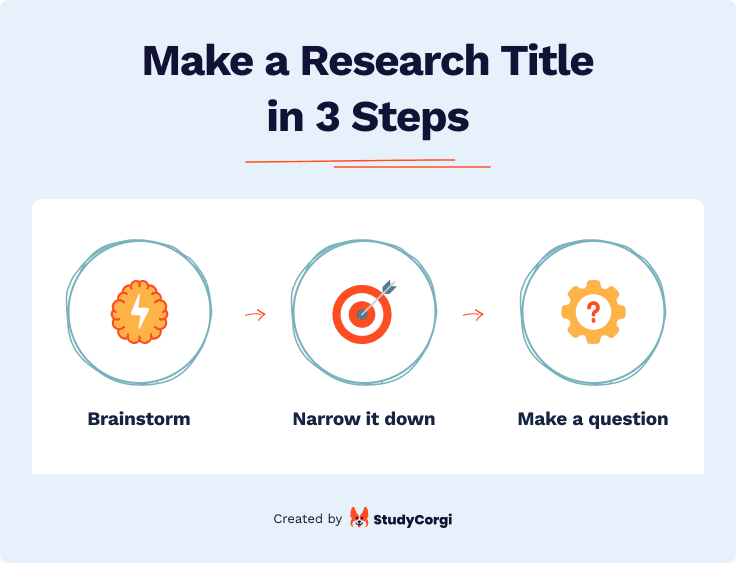
Step 1: Brainstorm
The first step to take before getting into your research is to brainstorm . To choose a good topic, you can do the following:
- Think of all your interests related to your field of study. What is the reason you've chosen this field? Think of the topics of your area that you like reading about in your free time.
- Go through your past papers and choose the ones you enjoyed writing. You can use some lingering issues from your previous work as a starting point for your research.
- Go through current events in your field to get an idea of what is going on. Whether you are writing a literary analysis , gender studies research, or any other kind of paper, you can always find tons of articles related to your field online. You can go through them to see what issue is getting more attention.
- Try to find any gaps in current researches in your field. Use only credible sources while searching. Try to add something new to your field with your research. However, do not choose a completely new issue.
- Discuss what topic is suitable for you with your professors. Professor knows a lot of information about current and previous researches, so try to discuss it with them.
- Discuss lingering issues with your classmates. Try to ask what questions do they have about your field.
- Think of your desired future work . Your research might serve as a starting point for your future career, so think of your desired job.
- Write down 5-10 topics that you might be interested in. Ph.D. or Master’s research should be specific, so write down all the appropriate topics that you came up with.
Step 2: Narrow It Down
As you are done brainstorming, you have a list of possible research topics. Now, it is time to narrow your list down.
Go through your list again and eliminate the topics that have already been well-researched before. Remember that you need to add something new to your field of study, so choose a topic that can contribute to it. However, try not to select a topic not researched at all, as it might be difficult.
Once you get a general idea of what your research will be about, choose a research supervisor. Think of a professor who is an expert in your desired area of research. Talk to them and tell them the reason why you want to work with them and why you chose this area of study.
As you eliminated some irrelevant topics and shortened your list to 1-3 topics, you can discuss them with your supervisor. Since your supervisor has a better insight into your field of study, they can recommend a topic that can be most suitable for you. Make sure to elaborate on each topic and the reason you chose it.
Step 3: Formulate a Research Question
The next step is to create a research question. This is probably the most important part of the process. Later you'll turn your research question into a thesis statement .
Learn as many materials as you can to figure out the type of questions you can ask for your research. Make use of any articles, journals, libraries, etc. Write notes as you learn, and highlight the essential parts.
First, make any questions you can think of. Choose the ones that you have an interest in and try to rewrite them. As you rewrite them, you can get a different perspective on each of the questions. An example of the potential question:
How did the economic situation in the 19th century affect literature?
Think of a question that you can answer and research best. To do it, think of the most convenient research process and available materials that you have access to. Do you need to do lab testing, quantitative analysis, or any kind of experiment? What skills do you have that can be useful?
Discuss the question that you came up with your supervisor. Get their feedback as they might have their own opinion on that topic and give you creative advice.
❓ Research Title Maker FAQ
❓ how to make a research title.
To make a research title:
- Brainstorm your field of study first.
- Think of the topics that you are interested in.
- Research current events in your study area and discuss your possible topics with your professors and classmates.
- Avoid random topics that are not well-researched.
❓ What is a working title for a research paper?
To make a good research paper title, analyze your area of study and all the related current events. Discuss your possible topics with your classmates and professors to get their opinion on them. You can also use our research title maker for free.
❓ What is the title page of a research paper?
The title page of the research paper is the first paper of your work. It includes your name, research type, and other essential information about your research.
❓ How to title a research proposal?
The research proposal title should be clear enough to showcase your research. Think of a statement that best describes your work and try to create a title that reflects it.
🔗 References
- Research Topics | Frontiers
- Organizing Your Social Sciences Research Paper
- Strategies for Selecting a Research Topic - ResearchGate
- The First Steps: Choosing a Topic and a Thesis Supervisor
- How to Pick a Masters Thesis Topic | by Peter Campbell
AI Index Report
The AI Index Report tracks, collates, distills, and visualizes data related to artificial intelligence. Our mission is to provide unbiased, rigorously vetted, broadly sourced data in order for policymakers, researchers, executives, journalists, and the general public to develop a more thorough and nuanced understanding of the complex field of AI. The report aims to be the world’s most credible and authoritative source for data and insights about AI.
Read the 2023 AI Index Report

Coming Soon: 2024 AI Index Report!
The 2024 AI Index Report will be out April 15! Sign up for our mailing list to receive it in your inbox.
Steering Committee Co-Directors

Ray Perrault
Steering committee members.

Erik Brynjolfsson

John Etchemendy

Katrina Ligett

Terah Lyons

James Manyika

Juan Carlos Niebles

Vanessa Parli

Yoav Shoham

Russell Wald
Staff members.

Loredana Fattorini

Nestor Maslej
Letter from the co-directors.
AI has moved into its era of deployment; throughout 2022 and the beginning of 2023, new large-scale AI models have been released every month. These models, such as ChatGPT, Stable Diffusion, Whisper, and DALL-E 2, are capable of an increasingly broad range of tasks, from text manipulation and analysis, to image generation, to unprecedentedly good speech recognition. These systems demonstrate capabilities in question answering, and the generation of text, image, and code unimagined a decade ago, and they outperform the state of the art on many benchmarks, old and new. However, they are prone to hallucination, routinely biased, and can be tricked into serving nefarious aims, highlighting the complicated ethical challenges associated with their deployment.
Although 2022 was the first year in a decade where private AI investment decreased, AI is still a topic of great interest to policymakers, industry leaders, researchers, and the public. Policymakers are talking about AI more than ever before. Industry leaders that have integrated AI into their businesses are seeing tangible cost and revenue benefits. The number of AI publications and collaborations continues to increase. And the public is forming sharper opinions about AI and which elements they like or dislike.
AI will continue to improve and, as such, become a greater part of all our lives. Given the increased presence of this technology and its potential for massive disruption, we should all begin thinking more critically about how exactly we want AI to be developed and deployed. We should also ask questions about who is deploying it—as our analysis shows, AI is increasingly defined by the actions of a small set of private sector actors, rather than a broader range of societal actors. This year’s AI Index paints a picture of where we are so far with AI, in order to highlight what might await us in the future.
- Jack Clark and Ray Perrault
Our Supporting Partners

Analytics & Research Partners

Stay up to date on the AI Index by subscribing to the Stanford HAI newsletter.
Advertisement
Supported by
A Critic’s Plea for Maximalism: ‘Crack Us Open Like Eggs’
In her first essay collection, Becca Rothfeld demonstrates that sometimes, more really is more.
- Share full article

By David Gates
David Gates teaches in the M.F.A. program at St. Joseph’s University.
- Barnes and Noble
- Books-A-Million
When you purchase an independently reviewed book through our site, we earn an affiliate commission.
ALL THINGS ARE TOO SMALL: Essays in Praise of Excess , by Becca Rothfeld
The essays I love favor abundance over economy, performance over persuasion. Zadie Smith’s exemplary “Speaking in Tongues” juggles Barack Obama, Shakespeare, Shaw’s “Pygmalion,” Pauline Kael on Cary Grant, Thomas Macaulay on the Marquess of Halifax and her own “silly posh” speaking voice. Its modest argument, that “flexibility of voice leads to a flexibility in all things,” disappears into the spectacle of a nimble mind reveling in its omnivorous erudition.
The critic Becca Rothfeld’s first collection, “All Things Are Too Small: Essays in Praise of Excess,” is splendidly immodest in its neo-Romantic agenda — to tear down minimalism and puritanism in its many current varieties — but, like Smith, she makes her strongest case in her essays’ very form, a carnival of high-low allusion and analysis. Macaulay, Cary Grant, Obama and a posh accent? Rothfeld will see you and raise you: How about Simone Weil, Aristotle, “Troll 2,” Lionel Trilling, Hadewijch of Brabant (from whom she takes her title), serial killer procedurals, Proust and the Talmud? Not that she neglects Cary Grant; in an essay on love and equality, she filters a smart reading of “His Girl Friday” through the philosopher Stanley Cavell.
Cynthia Ozick (who ought to know) has favorably — and justly — compared Rothfeld to “the legendary New York intellectuals,” though Rothfeld lives in D.C., where she’s the nonfiction book critic for The Washington Post. She’s also an editor at The Point, a contributing editor at The Boston Review, and has published in The New Yorker, The New York Review of Books, The Nation, The Atlantic, The Baffler and The British Journal of Aesthetics. Of course she also has a Substack, and she declares on her website — which links to many splendid pieces not collected in this book — that she’s “perhaps delusionally convinced” she’ll eventually finish her Harvard Ph.D. dissertation in philosophy.
The costive and the envious might wonder if she’s spreading herself too thin, but Rothfeld’s rigor and eloquence suggest that in her case, as the title of one essay has it, “More Is More.” That piece begins in dispraise of “professional declutterers” such as Marie Kondo, whose aesthetic amounts to “solipsism spatialized,” and from whose dream houses “evidence of habitation — and, in particular, evidence of the body, with its many leaky indecencies — has been eliminated.”
But it soon morphs into dispraise of minimalist prose and the “impoverished non-novels” of fashionable writers including Jenny Offill, Ottessa Moshfegh and Kate Zambreno, whose “anti-narratives are soothingly tractable, made up of sentences so short that they are often left to complete themselves.”
Rothfeld, by contrast, leaves no phrase unturned. Her maximalist prose abounds in alliteration — “I recommend bingeing to bursting,” she writes, exhorting us to “savor the slivers of salvation hidden in all that hideous hunger” — as well as such old-school locutions as “pray tell” and “cannot but be offensive.” If these mannerisms sit uneasily next to her f-worded celebrations of sexuality, the dissonance is deliberate, and the unease is a matter of principle.
In “Wherever You Go, You Could Leave,” a takedown of “mindfulness,” Rothfeld reports that when she “decided to live” after a suicide attempt in her first year of college, she rejected the soothing blankness of meditation and concluded that “perturbation is a small price to pay for the privilege of a point of view.”
Despite her disdain for “professional opinion-havers” — among them the columnist Christine Emba, lately also of The Washington Post — she doesn’t mind laying down the law. In the book’s longest essay, “Only Mercy: Sex After Consent,” Rothfeld taxes Emba, author of the best-selling “Rethinking Sex,” with an “appalling incomprehension of what good sex is like.”
So, pray tell. “We should choke, crawl, spank, spew, and above all, surrender furiously, until the sheer smack of sex becomes its own profuse excuse for being.” Some sexual encounters, she continues, “crack us open like eggs” and “we should not be willing to live without them.”
We-shoulding is an occupational hazard of opinion-having, but we need take these pronouncements no more — and no less — to heart than Rothfeld’s paradoxical admiration for both the “beatifically stylized” films of Éric Rohmer and the “magnificently demented” oeuvre of David Cronenberg. Do we agree or disagree with her that Sally Rooney’s novels are overpraised, and that Norman Rush’s “Mating” is really “one of the most perfect novels of the past half century”?
More to the point, do we agree that “the aesthetic resides in excess and aimlessness,” and that extravagance is “our human due”? I’d say no to the former and yes to the latter, but who cares? What counts in these essays is the exhilarating ride, not the sometimes-dodgy destination. William Blake wrote that the road of excess leads to the palace of wisdom; Rothfeld might say that they’re one and the same. No argument there.
ALL THINGS ARE TOO SMALL : Essays in Praise of Excess | By Becca Rothfeld | Metropolitan Books | 287 pp. | $27.99
Explore More in Books
Want to know about the best books to read and the latest news start here..
Stephen King, who has dominated horror fiction for decades , published his first novel, “Carrie,” in 1974. Margaret Atwood explains the book’s enduring appeal .
The actress Rebel Wilson, known for roles in the “Pitch Perfect” movies, gets vulnerable about her weight loss, sexuality and money in her new memoir.
“City in Ruins” is the third novel in Don Winslow’s Danny Ryan trilogy and, he says, his last book. He’s retiring in part to invest more time into political activism .
Jonathan Haidt, the social psychologist and author of “The Anxious Generation,” is “wildly optimistic” about Gen Z. Here’s why .
Do you want to be a better reader? Here’s some helpful advice to show you how to get the most out of your literary endeavor .
Each week, top authors and critics join the Book Review’s podcast to talk about the latest news in the literary world. Listen here .

Publications — Over 100 years of publishing excellence
- Book Author Resources
- Submit a Book Proposal
- AMS Rights, Licensing, and Permissions
- Open Math Notes
- Frequently asked questions
- Member Journals
- Research Journals
- Translation Journals
- Distributed Journals
- Open Access Journals
- Guidelines and Policies
- Journal Author Resources
Librarian Resources
- eBook Collections
- COUNTER Usage Statistics
- My Subscriptions
- Subscription Information
- Licensing Information
Mathematical Reviews/MathSciNet®
- MathSciNet ®
- Reviewer Home
- MathSciNet ® Subscriptions
Membership — Welcome to your membership center
Join the ams, renew your membership, give a membership, individual membership.
- Member Benefits
- Member Directory
- Reciprocating Societies
- Members in Developing Countries
Institutional Membership
- Domestic Institutions
- International Institutions
- Two-Year Institutions
- Graduate Student Chapter Program
Other Member Types
- Corporate Memberships
- Associate Memberships
Meetings & Conferences — Engage with colleagues and the latest research
National meetings.
- Joint Mathematics Meetings
- Upcoming JMMs
- Previous JMMs
- Special Lectures
- Professional Enhancement Programs (PEPs)
Sectional Meetings
- Upcoming Sectionals
- Previous Sectionals
- Presenting Papers
- Hosting Sectionals
Other Meetings, Conferences & Workshops
- Mathematics Research Communities
- Education Mini-conference
- International Meetings
- Mathematics Calendar
- Short Courses
- Workshop for Department Chairs and Leaders
Meetings Resources
- Suggest a Speaker
- AMS Meetings Grants
- Submitting Abstracts
- Welcoming Environment Policy
- MathSafe – supporting safe meetings
News & Outreach — Explore news, images, posters, and mathematical essays
News from the ams.
- AMS News Releases
- Feature Stories
- Information for Journalists
- In Memory Of
Math Voices
- Feature Column
- Math in the Media
- Column on Teaching and Learning
Explorations
- Recognizing Diverse Mathematicians
- AMS Posters
- Mathematics & Music
- Mathematical Imagery
- Mathematical Moments
Professional Programs — Resources and opportunities to further your mathematical pursuits
Professional development.
- Employment Services
- Mathjobs.org
- BEGIN Career Initiative
- Mathprograms.org
- Mathematical Opportunities Database
- Research Seminars
Institutional Information and Data
- Annual Survey of the Mathematical and Statistical Sciences
- CBMS Survey
- Other Sources of Data
- Directory of Institutions in the Mathematical Sciences
- Professional Directory
Grants & Support
- AMS-Simons Grants for PUI Faculty
- Travel Grants
- Fellowships & Scholarships
- Epsilon Fund
- Child Care Grants
Awards & Recognition
- AMS Prizes & Awards
- Fellows of the AMS
Education — Resources to support advanced mathematics teaching and learning
For students.
- Information for Undergraduate and High School Students
- Research Experiences for Undergraduates (REUs)
- Considering Grad School
- Find Grad Programs
- Applying to Grad School
- What do Mathematicians Do?
For Teachers
- Teaching Online
- Teaching Resources
- Inclusive Classrooms
- Assessing Student Learning
- Education Webinars
For Department Leaders & Mentors
- Information for Department Leaders
- paraDIGMS (Diversity in Graduate Mathematical Sciences)
Government Relations — Advocating for the mathematical sciences
Elevating mathematics in congress.
- Our Mission
- Letters, Statements, & Legislation
- Congressional Briefings
Legislative Priorities
- Federal Issues of Concern
- Federal Budget Process
Get Involved
- Advocacy Resources
- Take Action
DC-Based Fellowships
- Congressional Fellowship
- Mass Media Fellowship
- Catalyzing Advocacy in Science & Engineering (CASE) Fellowship
Giving to the AMS — Your gifts make great things happen for mathematics Make a Gift
What you can support.
- The 2020 Fund
- Next Generation Fund
- Birman Fellowship for Women Scholars
- JMM Child Care Grants
- MathSciNet for Developing Countries
Create a Legacy
- Make a Tribute Gift
- Create a Permanent Fund
- Establish a Prize, Award or Fellowship
- Bequests and Charitable Estate Planning
Honoring Your Gift
- Donor Stories
- Donor Wall of Honor
- Thomas S. Fiske Society
- AMS Contributors Society
- AMS Gardens
Giving Resources
- AMS Development Committee
- AMS Gift Acceptance Policy
About the AMS — Advancing research. Connecting the mathematics community.
Our organization.
- Executive Staff
- Equity, Diversity, & Inclusion
- Jobs at AMS
- Customer Service
Our Governance
- Board of Trustees
- Executive Committee
Governance Operations
- Calendar of Meetings
- Policy Statements & Guidelines
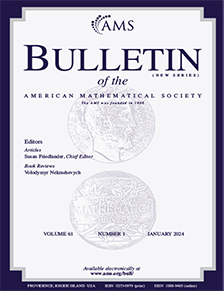
Bulletin of the American Mathematical Society
The Bulletin publishes expository articles on contemporary mathematical research, written in a way that gives insight to mathematicians who may not be experts in the particular topic. The Bulletin also publishes reviews of selected books in mathematics and short articles in the Mathematical Perspectives section, both by invitation only.
ISSN 1088-9485 (online) ISSN 0273-0979 (print)
The 2020 MCQ for Bulletin of the American Mathematical Society is 0.84 . What is MCQ? The Mathematical Citation Quotient (MCQ) measures journal impact by looking at citations over a five-year period. Subscribers to MathSciNet may click through for more detailed information.
- Articles in press
- Recently published
- All issues : 1891 – Present
Contents of Volume 61, Number 2 HTML articles powered by AMS MathViewer View front and back matter from the print issue
Help | Advanced Search
Computer Science > Computation and Language
Title: mapping the increasing use of llms in scientific papers.
Abstract: Scientific publishing lays the foundation of science by disseminating research findings, fostering collaboration, encouraging reproducibility, and ensuring that scientific knowledge is accessible, verifiable, and built upon over time. Recently, there has been immense speculation about how many people are using large language models (LLMs) like ChatGPT in their academic writing, and to what extent this tool might have an effect on global scientific practices. However, we lack a precise measure of the proportion of academic writing substantially modified or produced by LLMs. To address this gap, we conduct the first systematic, large-scale analysis across 950,965 papers published between January 2020 and February 2024 on the arXiv, bioRxiv, and Nature portfolio journals, using a population-level statistical framework to measure the prevalence of LLM-modified content over time. Our statistical estimation operates on the corpus level and is more robust than inference on individual instances. Our findings reveal a steady increase in LLM usage, with the largest and fastest growth observed in Computer Science papers (up to 17.5%). In comparison, Mathematics papers and the Nature portfolio showed the least LLM modification (up to 6.3%). Moreover, at an aggregate level, our analysis reveals that higher levels of LLM-modification are associated with papers whose first authors post preprints more frequently, papers in more crowded research areas, and papers of shorter lengths. Our findings suggests that LLMs are being broadly used in scientific writings.
Submission history
Access paper:.
- HTML (experimental)
- Other Formats
References & Citations
- Google Scholar
- Semantic Scholar
BibTeX formatted citation
Bibliographic and Citation Tools
Code, data and media associated with this article, recommenders and search tools.
- Institution
arXivLabs: experimental projects with community collaborators
arXivLabs is a framework that allows collaborators to develop and share new arXiv features directly on our website.
Both individuals and organizations that work with arXivLabs have embraced and accepted our values of openness, community, excellence, and user data privacy. arXiv is committed to these values and only works with partners that adhere to them.
Have an idea for a project that will add value for arXiv's community? Learn more about arXivLabs .
Developing ash-free high-strength spherical carbon catalyst supports
- Domestic Catalysts
- Published: 28 June 2013
- Volume 5 , pages 156–163, ( 2013 )
Cite this article
- V. V. Gur’yanov 1 ,
- V. M. Mukhin 1 &
- A. A. Kurilkin 1
49 Accesses
Explore all metrics
The possibility of using furfurol for the production of ash-free high-strength active carbons with spheroidal particles as adsorbents and catalyst supports is substantiated. A single-stage process that incorporates the resinification of furfurol, the molding of a spherical product, and its hardening while allowing the process cycle time and the cost of equipment to be reduced is developed. Derivatographic, X-ray diffraction, mercury porometric, and adsorption studies of the carbonization of the molded spherical product are performed to characterize the development of the primary and porous structures of carbon residues. Ash-free active carbons with spheroidal particles, a full volume of sorbing micro- and mesopores (up to 1.50 cm 3 /g), and a uniquely high mechanical strength (its abrasion rate is three orders of magnitude lower than that of industrial active carbons) are obtained via the vapor-gas activation of a carbonized product. The obtained active carbons are superior to all known foreign and domestic analogues and are promising for the production of catalysts that operate under severe regimes, i.e., in moving and fluidized beds.
This is a preview of subscription content, log in via an institution to check access.
Access this article
Price includes VAT (Russian Federation)
Instant access to the full article PDF.
Rent this article via DeepDyve
Institutional subscriptions
Similar content being viewed by others

Carbon adsorbents for methane storage: genesis, synthesis, porosity, adsorption
Ilya Men’shchikov, Andrey Shiryaev, … Anatoly Fomkin

Hierarchical nanostructured carbons as CO2 adsorbents
Kiara Montiel-Centeno, Deicy Barrera, … Karim Sapag
Carbon materials from the Sibunit family and methods for controlling their properties
G. V. Plaksin, O. N. Baklanova, … V. A. Likholobov
Burushkina, T.N., Zh. Ross. Khim. O-va im. D.I. Mendeleeva , 1995, vol. 39, no. 6, p. 122.
CAS Google Scholar
Kryazhev, Yu. G., Abstract of Papers, Materialy XII vserossiiskogo simpoziuma s uchastiem inostrannykh uchenykh “Aktual’nye problemy teorii adsorptsii, poristosti i adsorptsionnoi selektivnosti” (Proc. of XII th All-Russia Symposium with the Participation of Foreign Scientists “Urgent Problems of the Theory of Adsorption, Porosity, and Adsorption Selectivity”), Moscow, 2008, p. 69.
Google Scholar
Kartel’, N.T., in Adsorbtsiya, adsorbenty i adsorbtsionnye protsessy v nanoporistykh materialakh (Adsorption, Adsorbents, and Adsorption Processes in Nanoporous Materials), Tsivadze, A.Yu., Ed., Moscow: Granitsa, 2011, p. 381.
RF Patent 2026813, 1993.
RF Patent 2257343, 2003.
RF Patent 2301701, 2006.
Dubinin, M.M., Zaverina, E.D., Ivanova, L.S., Kaverov, A.T., and Kasatochkin, V.I., Rus. Chem. Bull. , 1961, vol. 10, no. 1, p. 14.
Article Google Scholar
Usenbaev, K. and Zhumalieva, K., Rentgenograficheskoe issledovanie struktury i termicheskikh preobrazovanii amorfnykh uglerodov (X-ray Study of the Structure and Thermal Transformations of Amorphous Carbons), Frunze: Mektep, 1976.
Gur’yanova, L.N. and Gur’yanov, V.V., Zh. Fiz. Khim. , 1984, vol. 58, no. 6, p. 1459; 1989, vol. 63, no. 1, p. 161; 1989, vol. 63, no. 2, p. 426; 1989, vol. 63, no. 3, p. 683.
Guryanov, V.V., Petukhova, G.A., and Dubinina, L.A., Prot. Metal. Phys. Chem. Surf. , 2010, vol. 46, no. 2, p. 191.
Article CAS Google Scholar
Guryanov, V.V., Dubinin, M.M., and Misin, M.S., Zh. Fiz. Khim. , 1975, vol. 49, no. 9, p. 2374.
Gur’yanov, V.V., Petukhova, G.A., and Polyakov, N.S., Rus. Chem. Bull. , 2001, vol. 50, no. 6, p. 974.
Dubinin, M.M., Carbon , 1989, vol. 27, no. 3, p. 457.
Belyaev, N.M., Soprotivlenie materialov (Strength of Materials), Moscow: Nauka, 1976.
Temkin, I.V., Proizvodstvo elektrougol’nykh izdelii (Production of Electrocarbon Articles), Moscow: Vysshaya shkola, 1980.
Download references
Author information
Authors and affiliations.
OAO Elektrostal’ Research and Production Association Neorganika, Elektrostal’, Moscow oblast, 144001, Russia
V. V. Gur’yanov, V. M. Mukhin & A. A. Kurilkin
You can also search for this author in PubMed Google Scholar
Additional information
Original Russian Text © V.V. Gur’yanov, V.M. Mukhin, A.A. Kurilkin, 2013, published in Kataliz v Promyshlennosti.
Rights and permissions
Reprints and permissions
About this article
Gur’yanov, V.V., Mukhin, V.M. & Kurilkin, A.A. Developing ash-free high-strength spherical carbon catalyst supports. Catal. Ind. 5 , 156–163 (2013). https://doi.org/10.1134/S2070050413020062
Download citation
Received : 08 December 2011
Published : 28 June 2013
Issue Date : April 2013
DOI : https://doi.org/10.1134/S2070050413020062
Share this article
Anyone you share the following link with will be able to read this content:
Sorry, a shareable link is not currently available for this article.
Provided by the Springer Nature SharedIt content-sharing initiative
- carbon adsorbent
- porous structure
- polymerization
- Find a journal
- Publish with us
- Track your research

- Vehicle Technologies Office
- About the Vehicle Technologies Office
- Technology Areas
- Technology Integration
- Reports and Publications
Office: Vehicle Technologies Office FOA number: DE-FOA-0003248 Link to apply: Apply on EERE Exchange FOA Amount: $45,800,000
Today, the Department of Energy (DOE) announced $45.8 million in new funding for projects that will advance research, development, demonstration, and deployment (RDD&D) critical to achieving net-zero greenhouse gas emissions in the transportation sector. The funding will drive innovation in equitable clean transportation and is aligned with strategies detailed in the U.S. National Blueprint for Transportation Decarbonization .
The funding is through DOE’s Office of Energy Efficiency and Renewable Energy (EERE). Topic areas in the Vehicle Technologies Office (VTO) Fiscal Year (FY) 2024 R&D funding opportunity include:
- Next-generation phosphate-based cathodes.
- Advancing the state of the art for sodium-ion batteries.
- Developing concepts for decreasing greenhouse gas emissions from off-road vehicles such as construction, agriculture, mining, and forestry vehicles.
- Developing and deploying vehicle-to-everything technologies that can lead to meaningful savings at the vehicle and transportation system level.
- Developing high-performance, domestically produced electrical steels (E-steels) for use in electrified powertrains.
- Addressing critical cybersecurity needs for smart and secure electric vehicle charging.
As part of the Biden-Harris Administration’s commitment to ensuring the benefits of a clean transportation system are shared equally, the funding seeks the participation of underserved communities and underrepresented groups. Applicants are required to describe how diversity, equity, and inclusion objectives will be incorporated into their project.
VTO provides a series of funding opportunity announcement (FOA) information session videos , which help applicants understand VTO’s FOA process and requirements. The recently released, Session 3: Tips for a Strong FOA Application, includes best practices for incorporating Diversity, Equity, Inclusion, and Accessibility in a project.
Learn more about this and other funding opportunities on VTO’s funding webpage .
Topic Areas
Topic Area 1: Next-Generation Phosphate-Based Cathodes
This topic area targets the development of phosphate-based cathode materials that surpass the performance of state-of-the-art lithium iron phosphate (LFP) cathode materials, which are currently gaining traction as an alternative low-cost solution. The primary objective of this area of interest is to develop high energy density battery cells containing phosphate-based cathodes at the material and cell level.
Topic Area 2: Na-ion Battery Seedling Projects for Electric Vehicle Applications
While shifting to alternative cathode materials like LFP can alleviate the impact of nickel and cobalt, the impact of lithium has not been adequately addressed. One alternative to lithium is sodium (Na). While there is much promise for Na-ion chemistries, key issues still limit their adoption. This objective of this topic area is to advance the state of the art for Na-ion batteries by solving key challenges for the cathode, anode, or electrolyte through the development of 1 Ah full cells utilizing cell chemistries that are significant advancements over current industry state-of-the-art Na-ion technology.
Topic Area 3: Low-GHG Concepts for Off-Road Vehicles
The objective of this topic area is to develop and validate technology concepts capable of significantly decreasing greenhouse gas emissions, energy use, harmful criteria emissions, and total cost of ownership across the entire off-road vehicle sector, including construction, agriculture, mining, forestry, ports, warehouses, etc. Concepts must demonstrate they can meet the unique requirements for off-road vehicles and gain customer acceptance.
Topic Area 4: Saving Energy with Connectivity
Research has shown that vehicle-to-everything (V2X) communications can lead to meaningful energy savings at the vehicle and transportation system level by integrating interoperable vehicle-to-vehicle (V2V), vehicle-to-infrastructure (V2I), and vehicle-to-pedestrian (V2P) communications. The objective of this topic area is to develop and deploy V2X technologies with a focus on the efficiency and convenience of the mobility ecosystem, while reducing transportation’s environmental impacts. Examples could include but are not limited to eco-driving along connected corridors, transit or freight priority, integrated corridor management, or passenger or freight trip-chaining optimization.
Topic Area 5: Domestically Produced Electrical Steels (E-Steels)
The US transportation sector is in a technology revolution where light-duty vehicles are rapidly transitioning from internal combustion engines to electrified powertrains. Although most of the vehicles are produced in the US, many of the powertrain components rely on imports and foreign supply chains. Of particular interest are traction motors and their components. The objective of this topic are is to develop E-Steels meeting properties including frequency, thickness, ductility, cost, and manufacturability.
Topic Area 6: Cybersecurity for Smart and Secure Electric Vehicle Charging
This topic area is addressing critical cybersecurity needs to address through two subtopics:
- Subtopic 6.a: Enabling Wide-scale, Cybersecure EV/EVSE Aggregation for Grid Services : To support the integration of electric vehicles (EVs) and their charging requirements with the electric grid, both government and the private sector have made significant investments in the development of smart charge management (SCM) systems and technologies for EV charging infrastructure. The objective of this subtopic area is to research, develop, and demonstrate systems, technologies, and tools necessary for the cybersecure aggregation of EVs and charging infrastructure to provide widescale, cybersecure grid services.
- Subtopic 6.b: Tools to Assess EV/EVSE/Charging System Cybersecurity Posture and Compliance with Standards and Protocols for Communications, Controls, and Monitoring : Testing and evaluation of Electric Vehicle Supply Equipment (EVSE) by DOE national laboratories has clearly indicated a lack of compliance by many vendors with certified and/or regulated EV charging standards and protocols. In addition to creating cybersecurity vulnerabilities, this non-compliance greatly inhibits interoperability, supplier-managed SCM, and right-to-repair. The objective of this subtopic is to research, develop, and validate a suite of tools and associated procedures to comprehensively assess EV/EVSE/charging system compliance with relevant standards and protocols and cybersecurity posture.
Additional Information
- Download the full funding opportunity on the EERE Exchange website.
- For FOA-specific support, contact [email protected] .
- Sign up for the Office of Energy Efficiency and Renewable Energy (EERE) funding email list to get notified of new EERE funding opportunities. Also sign up for VTO’s newsletter to stay current with the latest news.
- Watch the VTO Funding Opportunity Announcement information series webinars.
- Harvard Library
- Research Guides
Expos 20 | Fashion Icons: Power and Style
- Tools for Deep-Searching, Close-Looking, or Special Focus
- Fashion Icons: Research Guide
- HOLLIS: Searching Panoramically Across Harvard's Discovery Space
Iconic Titles
Fashion history, academic databases: why use them, three to try, if you're feeling adventurous.
- Generating Research Leads From What You Have in Hand
- Getting around Paywalls on the Web
- Citing Your Sources
Vogue Archive Harvard Key
- A searchable archive of American Vogue, from the first issue in 1892 to the current month,
WWD: Women's Wear Daily Harvard Key
- Often referred to as the "Bible" of the fashion trade industry, Women's Wear Daily (WWD) has been publisehd since 1910 and has charted the emergence, rise, fall, and evolution of fashion trends. This database covers 2000-present.
Berg Fashion Library
- A resource for fashion studies, it contains encyclopedias, e-book content, museum and image collections.

Research projects often require you to look close up at a body of research produced by scholars in a particular field. This research is typically collected, codified, and made findable in a tool called a subject database .
Every academic discipline has at least one subject database that's considered the disciplinary gold standard -- a reliable, (relatively) comprehensive, and accurate record of the books that scholars are publishing, and the ideas they're debating and discussing in important and influential journals.
Databases are like lenses: they change what you see and how you see it -- and they offer you easy and efficient ways to bring your questions into sharper focus.
Academic Search Premier Harvard Key
- A multidisciplinary database that's often good to try after HOLLIS especially for current journal articles.
Sociological Abstracts Harvard Key
- Great for looking at social trends and behaiors, incluidng those that intersect with dress, fashion, and celebrity.
One Business Harvard Key
- << Previous: HOLLIS: Searching Panoramically Across Harvard's Discovery Space
- Next: Generating Research Leads From What You Have in Hand >>
Except where otherwise noted, this work is subject to a Creative Commons Attribution 4.0 International License , which allows anyone to share and adapt our material as long as proper attribution is given. For details and exceptions, see the Harvard Library Copyright Policy ©2021 Presidents and Fellows of Harvard College.

IMAGES
VIDEO
COMMENTS
The research title is an important element of your research paper. Follow these steps to make the perfect title for your paper. 1-888-627-6631 ... published. In fact, a 2014 review of more than 150,000 papers submitted to the UK's Research Excellence Framework (REF) database found the style of a paper's title impacted the number of ...
Research Paper Title. Research Paper Title is the name or heading that summarizes the main theme or topic of a research paper.It serves as the first point of contact between the reader and the paper, providing an initial impression of the content, purpose, and scope of the research.A well-crafted research paper title should be concise, informative, and engaging, accurately reflecting the key ...
Make sure your research title describes (a) the topic, (b) the method, (c) the sample, and (d) the results of your study. You can use the following formula: [ Result ]: A [ method] study of [ topic] among [ sample] Example: Meditation makes nurses perform better: a qualitative study of mindfulness meditation among German nursing students. Avoid ...
Writing effective headings. Although similar, headings are not the same as titles. Headings head paragraphs and help structure a document. Effective headings make your paper easily scannable. Common high level headings in dissertations and research papers are "Methods", "Research results", and "Discussion". Lower level headings are ...
Here are other rules for how to create a good title: Title every section of writing: In the process of writing, create interesting subheadings to give your paragraphs an identity. Also, they make your text look ordered and clear. The title must bear the theme of the text: choose a title that summarizes the essay. Capitalize all words with certain exceptions: Capitalize the first letter of ...
How-to: When crafting a title, says De Ranieri, write down the main result of the manuscript in a short paragraph. Shorten the text to make it more concise, while still remaining descriptive ...
Search engines use titles to retrieve relevant articles based on users' keyword searches. Once readers find your article, they'll use the title as the first filter to decide whether your research is what they're looking for. A strong and specific title is the first step toward citations, inclusion in meta-analyses, and influencing your field.
The Final Title Effective titles in research papers have several characteristics that reflect general principles of academic writing. ... Subtitles are frequently used in social sciences research papers because it helps the reader understand the scope of the study in relation to how it was designed to address the research problem.
A good research paper title: So here are three basic tips to keep in mind while writing a title: 1] Keep it simple, brief and attractive: The primary function of a title is to provide a precise summary of the paper's content. So keep the title brief and clear. Use active verbs instead of complex noun-based phrases, and avoid unnecessary details.
Paste your content: Once logged in, paste your research paper's content or abstract onto the document. Generate your title: Click on 'Templates' in the side navigation pane, go to Titles, and select 'Generate' . Paperpal will analyze your content and propose a fitting research paper title. If it doesn't quite hit the mark, simply ...
The title is getting closer to the final stage, but it is still too long. Read the next steps to create a working title for your research document. Step 4. Skim to The Fewest Words Possible. Short and sweet is the golden rule for a suitable and good research paper title. Here is how you should keep your title concise:
In addition to the above process, keep the following main tips in mind when writing an effective research paper title: Write your paper and abstract first, then work on your title. This will make the process much easier than trying to nail a title down without a full, finished paper to start from. Keep your title short!
Here are some important factors that create an engaging and interesting research paper title: Clarity and Precision: Clearly conveys the main idea. Relevance to Content: Reflects core focus and findings. Conciseness: Keeps title brief and to the point. Keywords and Phrases: Includes important search keywords.
Scientific Paper Title. Here are 5 examples of research titles for scientific papers: "Exploring the Impact of Climate Change on Biodiversity Patterns in Tropical Rainforests: A Multidisciplinary Analysis". "Quantifying the Influence of Microplastic Pollution on Aquatic Ecosystems: A Comprehensive Field Study".
Research Paper Title Examples. Research papers test your ability to find credible sources and synthesize complex information into a well-structured format. These are almost exclusively academic, and as such, have formal titles. The first versions of these titles often end up being very long, so spend some time whittling away any extra information.
Follow the guidelines described next to format each element of the student title page. Place the title three to four lines down from the top of the title page. Center it and type it in bold font. Capitalize major words of the title. Place the main title and any subtitle on separate double-spaced lines if desired.
We developed our Essay Title Generator to help you create the title your paper deserves. Enter the topic and a random essay title will be generated for you. ... Our titles help to illuminate the research process. They give you an indication of where you can go and what you can do. As soon as you feel like you're getting stuck and need some ...
Welcome to our free online research title generator. You can get your title in 3 simple steps: Type your search term and choose one or more subjects from the list, Click on the "Search topic" button and choose among the ideas that the title generator has proposed, Refresh the list by clicking the button one more time if you need more options.
ReALM: Reference Resolution As Language Modeling. Reference resolution is an important problem, one that is essential to understand and successfully handle context of different kinds. This context includes both previous turns and context that pertains to non-conversational entities, such as entities on the user's screen or those running in the ...
AI Index Report. The AI Index Report tracks, collates, distills, and visualizes data related to artificial intelligence. Our mission is to provide unbiased, rigorously vetted, broadly sourced data in order for policymakers, researchers, executives, journalists, and the general public to develop a more thorough and nuanced understanding of the ...
Many high school essays are written in MLA or APA style. Ask your teacher what format they want you to follow if it's not specified. 3. Provide your own analysis of the evidence you find. Give relevance to the quotes of information you provide in your essay so your reader understands the point you are trying make.
The 2024 ESMA Research Conference aims to bring together academics, policymakers and industry professionals to discuss and analyse the impact of environmental risks and ESG transition on EU securities markets. The conference will explore developments and risks in this area, considering both investor protection and financial stability implications.
In her first essay collection, Becca Rothfeld demonstrates that sometimes, more really is more. By David Gates David Gates teaches in the M.F.A. program at St. Joseph's University. When you ...
The Bulletin publishes expository articles on contemporary mathematical research, written in a way that gives insight to mathematicians who may not be experts in the particular topic. The Bulletin also publishes reviews of selected books in mathematics and short articles in the Mathematical Perspectives section, both by invitation only.
41%. Percentage of teens with the highest social media use who rate their overall mental health as poor or very poor, compared with 23% of those with the lowest use. For example, 10% of the highest use group expressed suicidal intent or self-harm in the past 12 months compared with 5% of the lowest use group, and 17% of the highest users expressed poor body image compared with 6% of the lowest ...
In comparison, Mathematics papers and the Nature portfolio showed the least LLM modification (up to 6.3%). Moreover, at an aggregate level, our analysis reveals that higher levels of LLM-modification are associated with papers whose first authors post preprints more frequently, papers in more crowded research areas, and papers of shorter lengths.
Abstract. The possibility of using furfurol for the production of ash-free high-strength active carbons with spheroidal particles as adsorbents and catalyst supports is substantiated. A single-stage process that incorporates the resinification of furfurol, the molding of a spherical product, and its hardening while allowing the process cycle ...
Office: Vehicle Technologies Office FOA number: DE-FOA-0003248 Link to apply: Apply on EERE Exchange FOA Amount: $45,800,000 Today, the Department of Energy (DOE) announced $45.8 million in new funding for projects that will advance research, development, demonstration, and deployment (RDD&D) critical to achieving net-zero greenhouse gas emissions in the transportation sector.
Research projects often require you to look close up at a body of research produced by scholars in a particular field. This research is typically collected, codified, and made findable in a tool called a subject database.. Every academic discipline has at least one subject database that's considered the disciplinary gold standard -- a reliable, (relatively) comprehensive, and accurate record ...
A 'read' is counted each time someone views a publication summary (such as the title, abstract, and list of authors), clicks on a figure, or views or downloads the full-text. ... 21 Research Items ...